
Flags and national anthems are the two most important tokens of the representation of national identities. However, since national anthems consist of lyrics and music, it’s a little more effective in getting the feelings across. The lyrics usually express a country’s power, independence, and patriotic sentiments, which touch people’s hearts deeply. Furthermore, with the help of music and the act of singing, the nation becomes as one heart, which beats as one together.
Every national anthem is unique and has its own story behind it. Would you like to know the history of the Turkish national anthem? What is the national anthem of Turkey called? How about learning the Turkish national anthem’s lyrics in English?
 Table of Contents
Table of Contents
- Vocabulary Relevant to National Anthems
- History of Turkish National Anthem – ‘İstiklal Marşı’
- Lyrics of İstiklal Marşı
- Where, When, and How is the Turkish National Anthem Sung?
- All about Turkish Language and Turkish Culture
1. Vocabulary Relevant to National Anthems
| Turkish | English |
| Milli | “National” |
| Marş | “March” |
| Bayrak | “Flag” |
| Saygı | “Respect” |
| Ceremony | “Tören” |
| Geçit töreni | “Parade” |
| Vatansever | “Patriot” |
| Vatanseverlik | “Patriotism” |
| Official | “Resmi” |
| Güfte/söz | “Lyrics” |
| Orkestrasyon | “Orchestration” |
| Beste | “Composition” |
2. History of Turkish National Anthem – ‘İstiklal Marşı’
1. Content and the origin of content
Turkish history goes back thousands of years, and the rule of theOttoman Empire is a significant period. Upon the defeat of the Ottoman Empire at the end of World War 1, some regions of the Ottoman Empire were occupied by other countries. In 1919, the War of Independence was started to ensure and protect the integrity of the country. This war ended successfully in 1923 and led to the establishment of the Republic of Turkey.
In 1921, it was announced in the nation that an original National March was going to be selected and awarded in a competition. The aim was to motivate the battling military forces and to encourage and honor the whole nation for an independent land at the end of the war.
724 poems took part in the competition. However, none of them were found to be suitable as a National March.
It was realized that Mehmet Akif Ersoy, who was a famous poet at that time, hadn’t participated in the competition. He hadn’t sent a poem because he disapproved of the fact that there was a monetary reward for the winner.
The National Parliament convinced him to write and present a poem and ignore the prize. Finally, he sent his poem, which consisted of 10 verses. He expressed his confidence in the courage and self-sacrifice of the Turkish soldiers and the Turkish nation’s commitment to independence, God, homeland, and religion in this poem. He was, basically, referring to the Turkish War of independence.
2. Adoption and the lyricist
Mehmet Akif Ersoy’s poem, which was titled İstiklal Marşı (“Independence March”), was adopted as the Turkish National Anthem on March 12th, 1921, before the establishment of the Turkish Republic.
Do you know what happened to the reward he was entitled to? It was donated to a foundation, which provided poor women and children with new skills so that they could find jobs and make some money.
3. Composer and Orchestrator
After the adoption of the lyrics, there was a Turkish national anthem composer competition for the musical composition of the poem. 24 composers participated in this competition. However, due to the war in the country, there was no time to evaluate the results. Therefore, the poem was sung differently in the country’s different regions.
In 1924, Ali Rıfat Çağatay’s composition was selected. His music was used until 1930. Then, the composition, prepared in 1922 by Osman Zeki Üngör, the conductor of the Presidential Symphony Orchestra, started being used. However, it’s claimed that this music was composed for some other lyrics, not for the İstiklal Marşı.Later on, it was orchestrated by Edgar Manas.
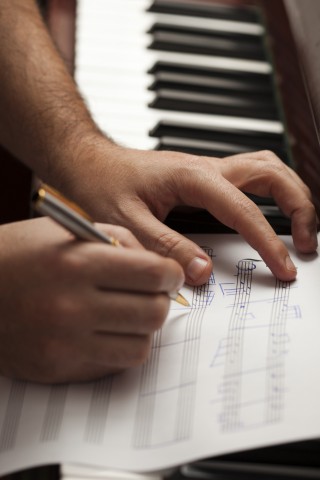
3. Lyrics of İstiklal Marşı
İstiklal Marşı consists of 10 verses. Only verses 1 and 2 are sung as the National Anthem!
Please note that the words “the star and the crescent,” which are mentioned a few times in the poem, represent the star and the crescent on the Turkish flag.
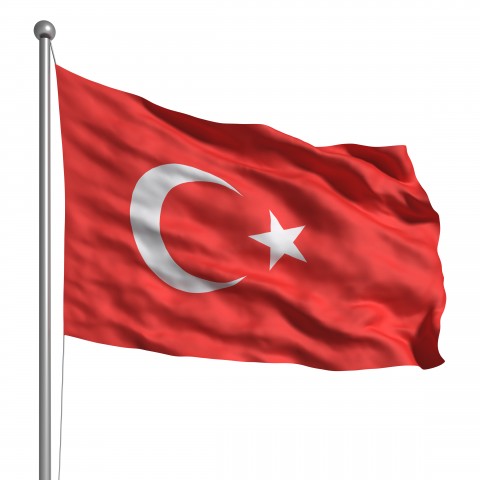
Below, you can find the Turkish national anthem in English. Please note that the Ministry of Foreign Affairs of Turkey has translated the first two verses below. The remaining 8 verses below have been translated by Assoc. Prof. Dr. Günil Özlem Ayaydın Cebe.
| 1 | Korkma, sönmez bu şafaklarda yüzen al sancak; Sönmeden yurdumun üstünde tüten en son ocak. O benim milletimin yıldızıdır, parlayacak; O benimdir, o benim milletimindir ancak. | Fear not, the crimson flag, waving in these dawns will never fade Before the last hearth that is burning in my nation vanishes. That is my nation’s star, it will shine; That is mine, it belongs solely to my nation. |
| 2 | Çatma, kurban olayım çehreni ey nazlı hilâl! Kahraman ırkıma bir gül… ne bu şiddet bu celâl? Sana olmaz dökülen kanlarımız sonra helâl, Hakkıdır, Hakk’a tapan, milletimin istiklâl. | Oh coy crescent, do not frown for I am ready to sacrifice myself for you! Please smile upon my heroic nation, why that anger, why that rage? If you frown, our blood shed for you will not be worthy. Freedom is the right of my nation who worships God and seeks what is right. |
| 3 | Ben ezelden beridir hür yaşadım, hür yaşarım. Hangi çılgın bana zincir vuracakmış? Şaşarım! Kükremiş sel gibiyim; bendimi çiğner, aşarım; Yırtarım dağları, enginlere sığmam, taşarım. | I have been free since eternity, and free shall I be. What fool dares to shackle me? I defy the temerity! I am like a roaring flood; I overflow trampling down my banks, I tear apart mountains, surge into depths, and surpass. |
| 4 | Garb’ın âfâkını sarmışsa çelik zırhlı duvar; Benim iman dolu göğsüm gibi serhaddim var. Ulusun, korkma! Nasıl böyle bir îmânı boğar, “Medeniyet!” dediğin tek dişi kalmış canavar? | Western horizons may be encircled by walls armored in steel But I have my chest brimful of faith as my homeland’s frontier. Let it howl, fear not! How can it smother such solid faith That single-fanged monster, “Civilization!” as you call it? |
| 5 | Arkadaş! Yurduma alçakları uğratma sakın; Siper et gövdeni, dursun bu hayâsızca akın. Doğacaktır sana va’dettiği günler Hakk’ın… Kim bilir, belki yarın… belki yarından da yakın. | My friend! Never ever let the dastards into my land! Render your body a shield; bring this heinous raid to an end. For soon shall break the blissful days God promised, for sure; Perhaps tomorrow, who knows, perhaps even sooner than that. |
| 6 | Bastığın yerleri “toprak!” diyerek geçme, tanı! Düşün altındaki binlerce kefensiz yatanı. Sen şehîd oğlusun, incitme, yazıktır atanı; Verme, dünyâları alsan da, bu cennet vatanı | Do not assume what you tread on is mere “earth”, recognize it! Think of the thousands, without shrouds, lying beneath. You’re the son of a martyr, take shame, hurt not your ancestor; Cede not this heavenly homeland, even if it’s the worlds you’re granted. |
| 7 | Kim bu cennet vatanın uğruna olmaz ki fedâ? Şühedâ fışkıracak, toprağı sıksan şühedâ! Cânı, cânânı, bütün varımı alsın da Hudâ, Etmesin tek vatanımdan beni dünyâda cüdâ | Who would not offer his life for this homeland of paradise? Martyrs would pour forth, all martyrs, should one simply clutch the earth! If God will, He may take my life, my beloved, and my wealth, But may He not, for the world, just deprive me of my homeland. |
| 8 | Ruhumun senden, İlâhî, şudur ancak emeli: Değmesin ma’bedimin göğsüne nâ-mahrem eli! Bu ezanlar-ki şehâdetleri dînin temeli Ebedî yurdumun üstünde benim inlemeli | The sole wish of my soul, oh glorious God, from You is that, No heathen would ever, on the bosom of my temple, lay hand! These calls to prayer, whose testimonies are the ground of religion, Should resound far and wide over my eternal homeland. |
| 9 | O zaman vecd ile bin secde eder –varsa- taşım; Her cerîhamdan, İlâhî, boşanıp kanlı yaşım, Fışkırır rûh-i mücerred gibi yerden na’şım; O zaman yükselerek Arş’a değer, belki başım. | Then, my tombstone, if any, prostrates in rapture a thousand-fold, Of my every wound, oh glorious God, tears of blood gush forth, And out spurts my corpse, in pure spirit, from the ground, Perhaps then, shall ascend and to the heavens touch my crown! |
| 10 | Dalgalan sen de şafaklar gibi ey şanlı hilâl; Olsun artık dökülen kanlarımın hepsi helâl. Ebediyen sana yok, ırkıma yok izmihlâl: Hakkıdır, hür yaşamış bayrağımın hürriyet; Hakkıdır, Hakk’a tapan milletimin istiklâl! | So ripple and wave, like dawning skies, oh glorious crescent, So that every drop of my blood finally be blessed and worthy! Neither you nor my race shall ever be annihilated, For my flag, who has lived ever freely, has the right to liberty; For my nation, who worships God, has the right to independence! |
4. Where, When, and How is the Turkish National Anthem Sung?
1. Occasions
There is more to know about the Turkish national anthem. Let’s see when and where it’s played and sung.
1. At the beginning of the ceremonies of the official holidays,
2. At the welcoming and farewell ceremonies of the presidents of other countries,
3. At the welcoming and farewell ceremonies of the high-ranking commanders,
4. At the flag hoisting and lowering ceremonies,
5. In the reception of foreign ambassadors and other diplomats,
6. At the beginning of the ceremonies held in military units, schools, and institutions,
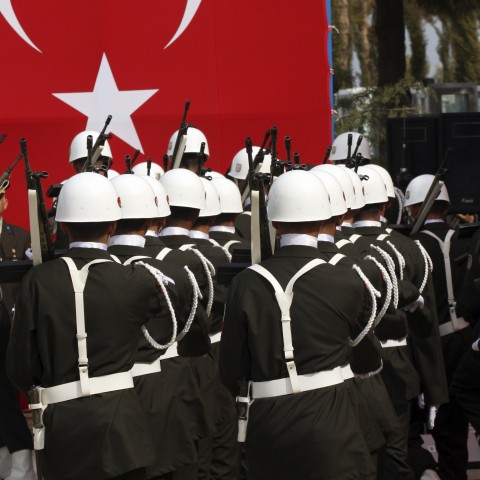
7. In special ceremonies where the president of the Turkish Republic will be present,
8. At the start and end times of radio and television broadcasts,
9. At the beginning of the association board meetings,
10. At the flag ceremonies held in schools (Every Monday morning and Friday afternoons and on special days),
11. At the military oath of enlistments,
12. In the visits of the statesmen to Anıtkabir (Ataturk‘s monumental tomb) and in other cases Anıtkabir visits,
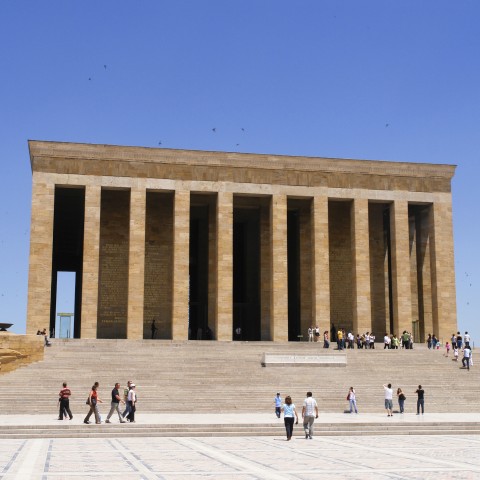
13. At medal ceremonies,
14. In international sports games,
15. In the farewell of martyrs,
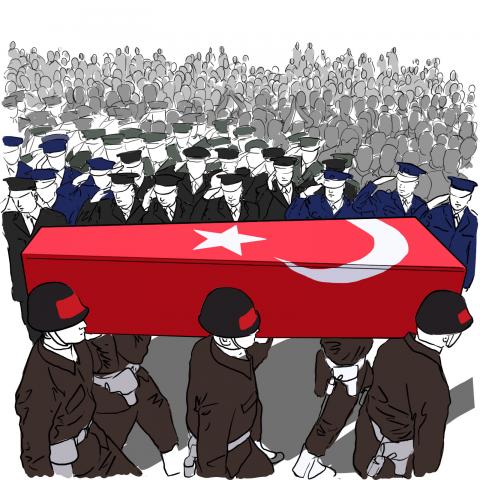
16. At state ceremonies,
17. In sports games,
18. In oath ceremonies and other ceremonies of military schools, unions and institutions,
19. Before the ceremonies and meetings of various parties, associations and organizations, etc.
2. National Anthem Etiquette in Turkey
Every country has its own national anthem etiquette. Here is what you should and shouldn’t do when the Turkish anthem is played:
1. Everyone must stop.
2. Everyone must stand up.
3. Everyone must stand at attention. (Straight, with feet together and arms by the sides)
4. Civilians have to take their hats off.
5. No eating, no talking, and no moving around during the march.
6. It must be sung in a respectful way.
One more piece of extra information about the Turkish anthem:
The lyrics of the Turkish national anthem, the Turkish flag, and the picture of Ataturk, the founder of the Turkish Republic, are framed and hung on the walls of every classroom in Turkey.
5. All about Turkish Language and Turkish Culture
In this article, you found out the answer to the question: “What is the name of the national anthem of Turkey?” Then you learned other facts about the Turkish national anthem, such as the Turkish national anthem’s lyrics in English, the history of the Turkish national anthem, the Turkish national anthem’s composer, and the national anthem etiquette in Turkey, etc. However, there is a lot more to know about Turkish culture and the Turkish language.
Therefore, visit TurkishClass101, which has numerous audio recordings, tons of vocabulary lists, and free resources, including the dictionary you can refer to, to get a better grasp of the Turkish language and its culture.
Don’t forget that there is also MyTeacher, which is the premium service of TurkishClass101 that you can use to practice with a private teacher.
Do you know what is also good about it? You can download the app for free and use it wherever you are.
Last but not the least, please continue to provide us feedback about all the resources provided at TurkishClass101!
Over 50 Useful Classroom Phrases in Turkish

Are you a foreign student who is planning to study in Turkey or are you a teacher who will be teaching in Turkey? In both cases, you will need to learn Turkish classroom words and phrases Turkish native speakers use.
If you are a student, you need to know school related vocabulary such as supplies, equipment, subjects etc. Furthermore, you should be able to understand the instructions given by your teacher. There are quite a number of Turkish classroom phrases for students in this article, which will make your life easier.
Dear teachers, I got you covered as well. I also included classroom phrases for teachers in Turkish so that you can communicate with your students smoothly.
Now, 1, 2, 3, eyes on me everybody; we are starting!
 Table of Contents
Table of Contents
- School Related Vocabulary
- Teacher’s Phrases
- Student’s Phrases
- Tests/Quizzes/Exams
- Learn More with TurkishClass101!
1. School Related Vocabulary
Here is a huge list of school related vocabulary you can refer to.
1. General vocabulary
Let’s follow the “general to specific” structure and start with general vocabulary.
| Turkish | English |
| Devlet okulu | “Public school” |
| Özel okul | “Private school” |
| İlkokul | “Elementary school” |
| Ortaokul | “Middle school” |
| Lise | “High school” |
| Üniversite | “University” |
| Dönem | “Semester” |
| Sömestr tatili | “Semester break” |
| Ödev | “Homework” |
| Not | “Grade” |
| Karne | “Report card” |
2. School buildings and rooms
There will be times when you need to find your way around in your school. The following vocabulary will be very helpful at those times:
| Turkish | English |
| Ana bina | “Main building” |
| Sınıf | “Classroom” |
| Kantin | “Canteen” |
| Kafeterya | “Cafeteria” |
| Kütüphane | “Library”; |
| Amfi | “Amphitheater” |
| Müzik odası | “Music room” |
| Öğretmenler odası | “Teachers’ room” |
| Sekreterlik | “Secretariat” |
3. Classroom equipment
Every classroom has some equipment used by students and teachers. Let’s see what they are called in Turkish.
| Turkish | English |
| Tahta | “Blackboard” |
| Akıllı tahta | “Smart board” |
| Tahta silgisi | “Blackboard eraser” |
| Tebeşir | “Chalk” |
| Tahta kalemi | “Board marker” |
| Bilgisayar | “Computer” |
| Projektör | “Projector” |
4. School supplies
Can you imagine that you forgot one of your school supplies at home and wanted to borrow it from a friend and you don’t know what it is called in Turkish? There is always a solution; maybe you can show it to your friend, so he/she would understand what you want. However, is this an efficient communication? Of course not. Why should you struggle? Just note the following list:
| Turkish | English |
| Okul çantası | “School bag” |
| Defter | “Notebook” |
| Kitap | “Book” |
| Kurşun kalem | “Pencil” |
| Tükenmez kalem | “Pen” |
| Silgi | “Eraser” |
| Kalemtıraş | “Pencil sharpener” |
| Kalem kutusu | “Pencil case” |
| Tablet | “Tablet” |

5. List of school subjects
Here comes Turkish to English translations of some vocabulary related to school subjects, which is important for both students and teachers:
| Turkish | English |
| Türkçe | “Turkish” |
| Türk dili ve edebiyatı | “Turkish Language and Literature” |
| İngilizce | “English” |
| Matematik | “Math” |
| Geometri | “Geometry” |
| Coğrafya | “Geography” |
| Tarih | “History” |
| Biyoloji | “Biology” |
| Kimya | “Chemistry” |
| Fizik | “Physics” |
| Müzik | “Music” |
| Resim | “Art” |
| Beden Eğitimi | “Physical Education” |
| Ekonomi | “Economics” |
| Felsefe | “Philosophy” |
2. Teacher’s Phrases
Our beloved teachers here comes your part where I will cover some classroom phrases for teachers in Turkish.
1. Greetings
Let’s begin with basic Turkish classroom greetings . Turkish native speakers use
| Turkish | English |
| Günaydın çocuklar/gençler | “Good morning children/youth” |
| Tünaydın | “Good afternoon” |
| İyi günler | “Good day” |
| Kendinize iyi bakın | “Take care of yourselves” |
| İyi dersler | “Enjoy your classes” |
2. Instructions
If you are looking for the answer to the question “How should a teacher give instructions in Turkish?” go ahead and check the basic Turkish phrases below:
| Turkish | English |
| Dikkatli dinleyin. | “Listen carefully.” |
| Tahtaya bakın lütfen. | “Look at the board, please.” |
| Hep beraber tekrar edelim. | “Let’s repeat together.” |
| Sorunuz varsa elinizi kaldırın. | “Raise your hand if you have a question.” |
| Sayfa 5’i açın. | “Open page 5.” |
| 3’lü gruplar oluşturun. | “Form groups of 3.” |
3. Questions
Teachers use questions as a teaching tool; sometimes they are used to find out what students have learnt or haven’t learnt and at times, they are used to make students participate. Let’s take a look at some questions teachers can use in a classroom where Turkish is spoken.
| Turkish | English |
| Bugün herkes burada mı? | “Is everybody here today?” |
| Herkes ödevini yaptı mı? | “Has everyone done their homework?” |
| Buraya kadar anladınız mı? | “Did you understand up to here?” |
| Kim cevap vermek ister? | “Who wants to answer?” |
| Bu konuyu kim anlatmak ister? | “Who wants to explain this topic?” |
| Kim okumak ister? | “Who wants to read?” |
| Herhangi bir sorunuz var mı? | “Do you have any questions?” |
| Sıra kimde? | “Who is next?” |
| Herkes bitirdi mi? | “Has everyone finished?” |
4. Discipline
When you are dealing with kids, sometimes things may go out of control. At that point, teachers have to use certain phrases to maintain discipline in the classroom. Make sure to note the following basic Turkish phrases; one day you might need them.
| Turkish | English |
| Oturun! | “Take a seat!” |
| Susun! | “Quit talking!” |
| Sessiz olun! | “Be quiet!” |
| Sorunuz varsa, elinizi kaldırın. | “Please raise your hand if you have a question.” |
| Cevabı biliyorsanız elinizi kaldırın. | “Raise your hand if you know the answer.” |

5. Praise and motivation
I believe the power of praise and motivation is unquestionable in education. Therefore, the Turkish classroom phrases below, will be another strong tool for teachers.
| Turkish | English |
| Aferin! | “Good job!” |
| Tebrikler! | “Congratulations!” |
| Aferin, böyle devam et. | “Keep up the good work.” |
| Tam isabet! | “Right on!” |
| İngilizceniz çok gelişti. | “Your English has improved a lot.” |
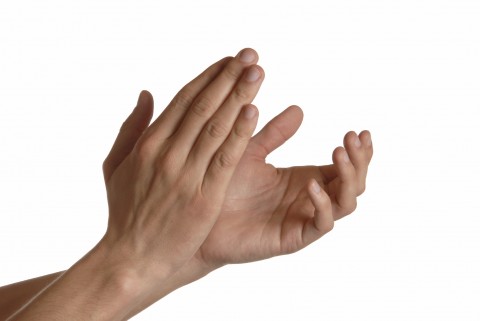
3. Student’s Phrases
Dear students, here are some Turkish classroom phrases for students you can use in different cases.
1. Greetings
Here are a few Turkish classroom greetings for students they can use to greet their teacher:
| Turkish | English |
| Günaydın hocam/öğretmenim | “Good morning teacher” |
| Tünaydın hocam | “Good afternoon teacher” |
| Hoşçakalın | “Good-bye” |
2. Concerns and questions
Are you wondering how you can address your concerns with your teacher in Turkish? Also, would you like to know how you can ask your questions in Turkish? Here comes a little help for you:
| Turkish | English |
| Anlamadım. | “I didn’t understand.” |
| Bunu tekrar edebilir misiniz lütfen? | “Can you repeat that please?” |
| Biraz daha yavaş anlatabilir misiniz? | Can you explain a little slower?” |
| Hangi sayfadayız? | “Which page are we on?” |
| Bir kere daha anlatabilir misiniz? | “Can you explain it one more time?” |
| Bana hiç anlamlı gelmiyor. | “It doesn’t make any sense to me?” |
| Bu doğru mu? | “Is this correct?” |
| Bana yardım edebilir misiniz? | “Can you help me?”; |
| Bir soru sorabilir miyim? | “May I ask a question?” |
| ‘xxx’ ne demek? | “What does ‘xxx’ mean?” |

3. Talking about problems
Problems are everywhere, even in classrooms. Following basic Turkish phrases will help you to talk about your problems:
| Turkish | English |
| Kendimi iyi hissetmiyorum, dışarı çıkabilir miyim? | “I am not feeling well, may I go out?” |
| Kitabımı kaybettim. | “I lost my book.” |
| Kitabımı evde unuttum. | “I forgot my book at home.” |
| Ödevimi yapamadım. | “I couldn’t do my homework.” |
| Tuvalete gidebilir miyim? | “Can I go to the restroom?” |
| Geç kaldığım için özür dilerim. | “I apologize for being late.” |
| Daha fazla süreye ihtiyacım var. | “I need more time.” |
| Alıştırmaları bitiremedim. | “I couldn’t complete the exercises.” |
| Yarın okula gelemeyeceğim. | “I won’t be able to come to school tomorrow.” |
4. Talking about school subjects
If you are a student, talking about school subjects is inevitable. Here is how you can do it in Turkish:
| Turkish | English |
| En sevdiğim ders ‘xxxx’. | “My favorite subject is ‘xxxx.” |
| Matematikte hiç iyi değilim. | “I am not good at Math, at all.” |
| Tarih dersini hiç sevmiyorum. | “I don’t like history class, at all.” |
4. Tests/Quizzes/Exams
Exams are parts of the education system, but also, they are the nightmares of most students. Let’s take a look at some Turkish classroom phrases for students related to exams.

1. Basic vocabulary
Here is Turkish to English translations of some vocabulary related with tests and exams you can refer to:
| Turkish | English |
| Test | “Test” |
| Sınav | “Exam” |
| Quiz | “Quiz” |
| Sınava girmek | “To take an exam” |
| Sınavı geçmek | “To pass the exam” |
| Sınavdan kalmak | “To fail an exam” |
2. Instructions
Reading the instructions in an exam can be as important as studying for the exam. You might know the answer, but if you don’t do exactly what the instructions tell you to do, you might fail your exam. Therefore, I strongly suggest that you pay attention to the following test instructions in Turkish.
| Turkish | English |
| Metni okuyun. | “Read the text.” |
| Boşlukları doldurun. | “Fill in the blanks” |
| Bu cümleleri tamamlayın. | “Complete these sentences.” |
| Doğru seçeneği işaretleyin. | “Mark the correct option.” |
5. Learn More with TurkishClass101!
In this article, you learned quite a number of Turkish classroom phrases for students and classroom phrases for teachers in Turkish. However, there are a lot more useful classroom phrases in Turkish!
Therefore, visit TurkishClass101, which has numerous audio recordings, tons of vocabulary lists and free resources including the dictionary you can refer to, in order to learn Turkish language faster or to improve your Turkish language learning.
Don’t forget that there is also MyTeacher, which is the premium service of TurkishClass101 that you can use to practice with a private teacher.
Do you know what is also good about it? You can download the app for free and use it wherever you are.
Last but not the least; please continue to provide us feedback about all the resources provided at TurkishClass101!

Your Guide for Dining Out: Turkish Restaurant Phrases

Turkish cuisine has a good reputation amongst the different cuisines in the world. Its variety and deliciousness are very well known.
If you are reading this article, you may either be visiting Turkey for some reason or possibly you are interested in the different flavors of Turkish cuisine.
If you don’t speak the language, I can imagine what crosses your mind:
“I don’t know how to order food in Turkish; I should learn Turkish restaurant vocabulary/phrases; How do I call a waiter/waitress in Turkey? How much tip should I leave?”
You don’t need to get stressed because we will cover common Turkish restaurant phrases as well as the relevant traditional facts in this article.
All you need to do is to note all the information below and dream of enjoying every bit of the amazing Turkish food.
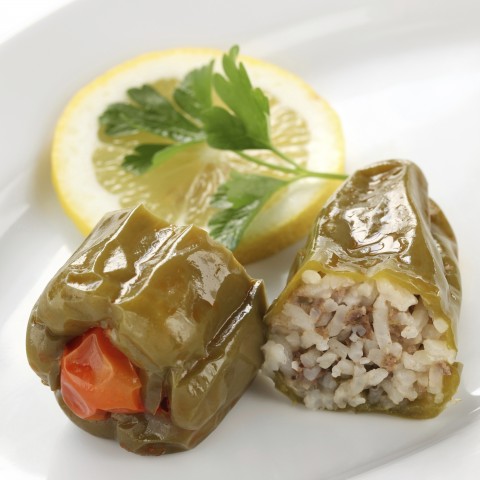
 Table of Contents
Table of Contents
- Dining Vocabulary
- Making a Reservation at a Restaurant
- Conversations During Dining
- Ordering food and beverages
- After Dining
- Compliments and Complaints
- All About Turkish
1. Dining Vocabulary
Before going into Turkish restaurant phrases, you should learn some dining vocabulary such as utensil names, food, beverages, tastes, etc. in Turkish. Let’s start with utensils.
1. Utensils
Below are the names of utensils in Turkish. If you want another plate or if you drop your fork, with the help of this vocabulary, you will be able to ask for another one.
| Turkish | English |
| Tabak | “Plate” |
| Kâse | “Bowl” |
| Bardak | “Glass” |
| Çatal | “Fork” |
| Bıçak | “Knife” |
| Kaşık | “Spoon” |
2. Food
The following vocabulary will make your life easier when you are ordering your food:
| Turkish | English |
| Tavuk | “Chicken” |
| Balık | “Fish” |
| Et | “Meat” |
| Salata | “Salad” |
| Ekmek | “Bread” |
| Çorba | “Soup” |
| Tatlı | “Dessert” |
| Dondurma | “Ice cream” |
3. Beverages
We got you covered for beverages as well.
| Turkish | English |
| Su | “Water” |
| Soda | “Sparkling water” |
| Bira | “Beer” |
| Şarap | “Wine” |
| Çay | “Tea” |
| Kahve | “Coffee” |
4. Tastes
As I mentioned above, Turkish cuisine is very rich and has many different varieties. Every region has its own unique tastes. Some regions are known for their very spicy foods. We suggest you take a close look at the following vocabulary to make sure the food you eat is not only pleasing to your eyes but also your mouth.
| Turkish | English |
| Tatlı | “Sweet |
| Acı | “Bitter” |
| Ekşi | “Sour” |
| Tuzlu | “Salty” |
| Baharatlı | “Spicy” Other |
5. Other
Here are some other restaurant-related words you might need:
| Turkish | English |
| Restoran | “Restaurant” |
| Masa | “Table” |
| Rezervasyon | “Reservation” |
| Menü | “Menu” |
| Peçete | “Napkin” |
| Bahşiş | “Tip” |
2. Making a Reservation at a Restaurant
In Turkey, you usually don’t need to make a reservation in a small or a mid-size restaurant. You might wait for a short time if there is no availability because the “first come, first served” principle will work. However, if you are celebrating a special occasion, if you are a large group of friends, if you are having a business dinner, or if you have special guests, then you shouldn’t take a risk, and you must make a reservation in advance.
Also, breakfast/brunch places are usually packed on the weekends. It might be a good idea to make a reservation in advance not to wait too long.
Furthermore, on special days like Valentine’s Day and New Year’s Eve, restaurants get booked way in advance, so try to get a reservation a month prior; do not wait until the last minute to make one; you won’t have any luck!
On the other hand, almost all luxurious restaurants and prestigious bars with live music require a reservation.
1. Reservation on the phone
If you are making a reservation on the phone, the following Turkish restaurant dialogue will help you tremendously:
Restaurant:
İyi günler. “Şamdan” restoran, nasıl yardımcı olabilirim? – “Good day. “Şamdan” restaurant, how may I help you?”
Customer:
İyi günler. 28 Temmuz Salı akşamı için iki kişilik rezervasyon yaptırmak istiyorum? – “Good day. I’d like to make a reservation for two on Tuesday, July 28th.”
Restaurant:
Tabi, hemen kontrol ediyorum. Saat kaç için rezervasyon yaptırmak istiyorsunuz? – “Sure, I’m checking right away. What time would you like to make a reservation?
Customer:
Akşam saat sekiz için lütfen. Bir de deniz kenarındaki masalardan biri olursa çok iyi olur. – “For eight o’clock in the evening, please. Also, it would be great if it could be one of the tables by the sea.”
Restaurant:
Tamam. 28 Temmuz Salı akşamı sekiz için iki kişi için deniz kenarında rezervasyonunuzu yaptım. Rezervasyonunuzu o akşam 8:15’e kadar tutabiliriz. Başka bir arzunuz var mı? – “Okay. I made a reservation for two people on Tuesday evening, July the 28th at 8 o’clock. We can hold your reservation until 8:15 p.m. that evening. Do you have any other requests?”
Customer:
Teşekkürler, hoşçakalın. – “Thanks. Good-bye.”
Restaurant:
Hoşçakalın – “Good-bye”
2. At the restaurant
If you are at the restaurant and trying to get a table or informing them about an existing reservation, the following phrases will be life savers for you:
– Brad James adına rezervasyonumuz vardı. – “We had a reservation under the name of Brad James.”
– 4 kişilik bir masa istiyoruz lütfen. – “We’d like a table for 4, please.”
– Nerede oturmak istersiniz? – “Where would you like to sit?”
– Sigarasız bölümde oturmak istiyoruz. – “We’d like to sit in the non-smoking section.”
– Bahçede yeriniz var mı? – “Do you have a table in the garden?”
– Ne kadar beklememiz gerekir? – “How long do we have to wait?”
3. Conversations During Dining
If you finally manage to get a table, you can take a deep breath and get ready for the next step!
1. Getting the waiter’s attention
Displaying a menu outside of the restaurant is not that common in Turkey. This is more common in tourist destinations. These days even though many cafes use QR code menus, which are accessible via smartphones by scanning a QR code, most restaurants still offer traditional printed menus. Therefore, you might still need the help of a waiter/waitress.
Here are a few ways you can call a waiter/waitress.
– Pardon, bakar mısınız? – “Excuse me.”
– Pardon, sipariş verebilir miyiz? – “Excuse me, can we order?”
2. All about the menu
Below are some common Turkish restaurant phrases you can use to get a menu and information about the food on the menu:
– Menüyü görebilir miyiz? – “Can we see the menu?”
– Şarap menüsünü alabilir miyiz lütfen? – “Could we have the wine menu please?”
– Tatlı menüsünü getirebilir misiniz lütfen? – “Could you bring the dessert menu please?”
– Ne tavsiye edersiniz? – “What would you recommend?”
– Bugünün spesiyalleri neler? – “What are today’s specials?”
– Günün çorbası nedir? – “What’s the soup of the day?”
– Menüde yöresel bir yemek var mı? – “Is there a regional dish on the menu?”
4. Ordering food and beverages
Here comes the most exciting part: ordering food and beverages.
1. Food
Your waiter/waitress will probably ask the following questions to get your order:
– Sipariş vermek için hazır mısınız? – “Are you ready to order?”
– Siparişinizi alabilir miyim? – “Can I have your order?”
– Ne yemek istersiniz? – “What would you like to eat?”

You can order your food with the following Turkish restaurant phrases:
– Ben sadece salata istiyorum. – “I just want a salad.”
– Çok pişmiş bonfile istiyorum ama yanında kızarmış patates istemiyorum. – “I’d like well-done steak, but I don’t want fried potatoes on the side.”
– Benim çileğe karşı alerjim var. Bu tatlıda çilek var mı? – “I’m allergic to strawberries. Are there any strawberries in this dessert?”
2. Beverages
Here is a Turkish restaurant dialogue for ordering beverages:
Waiter/waitress: Ne içmek istersiniz? – “What would you like to drink?”
Customer: – Sadece su alayım. – “Let me just get water.”
– Bir kadeh kırmızı şarap rica edeyim. – “I’d like a glass of red wine, please.”
– Çocuklar için portakal suyu lütfen. – “Orange juice for the children, please.”

3. Requesting additional sauces/ingredients and utensils
Let’s take a look at other basic Turkish phrases restaurant customers can refer to:
– Birkaç tane daha peçete alabilir miyim? – “Can I have a few more napkins?”
– Çatalımı düşürdüm. Bir tane daha alabilir miyim? – “I dropped my fork. Can I have another one?”
– Ketçap ve mayonez de getirebilir misiniz? – “Can you also bring ketchup and mayonnaise?”
– Kahve için biraz daha süt alabilir miyiz lütfen? – “Can we have some more milk for the coffee please?”
4. Providing feedback
Would you like to know how you can give feedback while you are still at the table? Here you go:
– Bu bardak kirli; değiştirebilir misiniz? – “This glass is dirty; can you change it?”
– Çorba çok tuzluydu. – “The soup was too salty.”
– Yemek çok lezzetliydi. – “Food was very delicious.”
– Ben bunu sipariş etmedim. – “I didn’t order this.”
– Biz bundan 3 tane sipariş ettik; iki değil. – “We ordered three of these, not two.”

5. Other information
– Pardon, sigara içilen kısım nerede? – “Sorry, where is the smoking area?”
– Pardon. tuvalet nerede acaba? – “Excuse me, where is the restroom?”
5. After Dining
Your meal is over, and I am sure you still have some questions. “Is it okay to ask for a doggy bag? How can I pay? How much of a tip do I need to give?”
In Turkey, it has recently started getting popular to ask for a doggy bag. However, it’s still not acceptable to ask for a box if you are at a luxurious restaurant.
As for tipping, in Turkey, there is nothing set in stone for the percentage. You can leave as much as you want. Giving around 10% of the bill as a tip has recently become popular.

Furthermore, tipping with a credit card is still not a common behavior in Turkey.
Note the following phrases:
– Kalanı paket yapabilir misiniz? – “Can you put the rest in a box?”
– Hesap lütfen. – “Bill, please.”
– Hesabı alabilir miyiz lütfen? – Could we get the bill, please?
– Ayrı ayrı ödeyebilir miyiz? – “Can we pay separately?”
– Kredi kartı kabul ediyor musunuz? – “Do you accept credit cards?”
– Üstü kalsın. – “Keep the change.”
– Kasada ödeyebilir miyiz? – “Can we pay at the register?”
– Bahşiş kutusu var mı? – “Is there a tip box?”
6. Compliments and Complaints
We hope you had an enjoyable and unforgettable dining experience. If that is the case, you can show your appreciation not only with a big tip but also with a sincere compliment. How? Here you go:
– Her şey çok güzeldi, teşekkürler. – “Everything was great, thank you.”
– Hızlı ve iyi servis için teşekkürler. – “Thanks for the fast and good service.”
– Yemekler harikaydı, çok beğendik. – “The food was great, we loved it.”
– Şefe teşekkürlerimizi iletin. – “Give our thanks to the chef.”
We hope not, but if you had a bad experience, that also has to be shared with a positive attitude. Here is how you can tell your dissatisfaction:
– Servisten hiç memnun kalmadık. Müdürle konuşmak istiyorum. – “We were not satisfied with the service at all. I’d like to speak with the manager.”
– Yemeklerden hiç memnun kalmadık. Müdürle konuşmak istiyorum. – “We were not satisfied with the food at all. I’d like to speak with the manager.”
7. All About Turkish
In this article, you learned some Turkish restaurant vocabulary/phrases and how to order food in Turkish. However, there is a lot more to know!
Therefore, visit TurkishClass101, which has numerous audio recordings, tons of vocabulary lists, and free resources including the dictionary you can refer to, in order to get a better grasp of the Turkish language and the culture.
Don’t forget that there is also MyTeacher, which is the premium service of TurkishClass101 that you can use to practice with a private teacher.
Do you know what is also good about it? You can download the app for free and use it wherever you are.
Last but not the least; please continue to provide us feedback about all the resources provided at TurkishClass101!

Turkish Animal Names and Related Vocabulary

Are you an animal lover?
If so, today is your lucky day!
In this article, we’ll teach you the names of different animals in the Turkish language. We have divided the animals by category as follows:
- Pets
- Farm animals
- Wild animals
- Sea animals
- Bugs and insects
- Birds
- Reptiles and amphibians
In addition, we’ll teach you what to call the body parts of animals, some relevant verbs, and even a few interesting idioms that mention animals.
But first things first: The word for “animal” in Turkish is hayvan.
The fact that the Turkish word is totally different from its English counterpart might have scared you, but don’t worry! Many animal names are written identically in Turkish as they are in English. For example: hamster, iguana, jaguar, koala, panda, tarantula, and zebra.
There are also some animals whose Turkish spelling is very close to its English spelling. Are you ready for a test? Let’s see if you can guess which animals these are: leopar, panter, pelikan, penguen, pirana, and piton.
I bet you passed the test. But just in case, here are the answers: leopard, panther, pelican, penguin, piranha, and python.
Now, it’s time to move ahead to our list of animal names in Turkish!
 Table of Contents
Table of Contents
- Pets (Evcil Hayvanlar)
- Farm Animals (Çiftlik Hayvanları)
- Wild Animals (Vahşi Hayvanlar)
- Sea Animals (Deniz Hayvanları)
- Bugs & Insects (Böcekler & Haşarat)
- Birds
- Reptiles & Amphibians
- Body Parts of Animals
- Animal-Related Idioms and Slang Expressions
- Animal-Related Verbs
- Learn More About the Turkish Language with TurkishClass101
1. Pets (Evcil Hayvanlar)
The most popular pet animals in Turkey are cats, dogs, birds, and fish. There are also some families that prefer to have hamsters, turtles, or rabbits at home.
Here are the names of some common pets in Turkish:
| Turkish | English |
| Balık | “Fish” |
| Hamster | “Hamster” |
| Kaplumbağa | “Turtle” |
| Kedi | “Cat” |
| Köpek | “Dog” |
| Kuş | “Bird” |
| Tavşan | “Rabbit” |
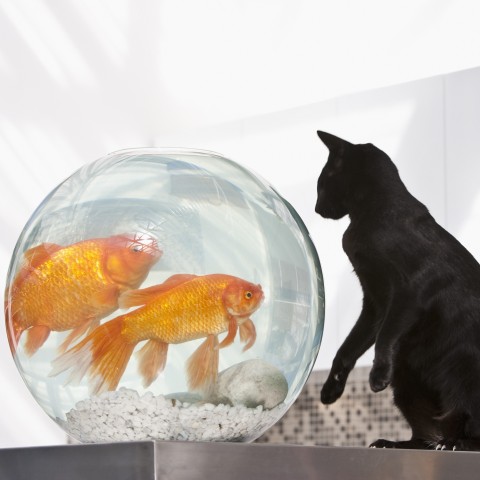
2. Farm Animals (Çiftlik Hayvanları)
Like other countries, Turkey is home to a range of farm animals. They are bred for their meat, milk, eggs, skin, and wool. Most of the livestock in Turkey can be found in the Aegean and Marmara regions, as well as in Central and Eastern Anatolia.
Here are the names of common farm animals in Turkish:
| Turkish | English |
| At | “Horse” |
| Domuz | “Pig” |
| Eşek | “Donkey” |
| Horoz | “Rooster” |
| İnek | “Cow” |
| Kaz | “Goose” |
| Keçi | “Goat” |
| Koyun | “Sheep” |
| Kuzu | “Lamb” |
| Ördek | “Duck” |
| Tavuk | “Chicken” |
3. Wild Animals (Vahşi Hayvanlar)
Below are the names of wild animals that we most often find in zoos. However, I’m sure that some people get to see them in the highlands, woods, or rural areas.
| Turkish | English |
| Aslan | “Lion” |
| Ayı | “Bear” |
| Fil | “Elephant” |
| Geyik | “Deer” |
| Kaplan | “Tiger” |
| Kurt | “Wolf” |
| Leopar | “Leopard” |
| Maymun | “Monkey” |
| Tilki | “Fox” |
| Zebra | “Zebra” |
| Zürafa | “Giraffe” |

4. Sea Animals (Deniz Hayvanları)
Turkey is surrounded by seawater on its three sides and has around 8333 kilometers (5178 miles) of shoreline. Due to the country’s geographic location, we have a booming fishing industry! 200 fish species live in the Sea of Marmara, 247 in the Black Sea, 300 in the Aegean Sea, and 500 in the Mediterranean. Of these, about 100 fish species are of particular economic value for Turkey.
Let’s see some of the sea animal names in Turkish:
| Turkish | English |
| Ahtapot | “Octopus” |
| Balina | “Whale” |
| Deniz atı | “Seahorse” |
| Istakoz | “Lobster” |
| Karides | “Shrimp” |
| Köpek balığı | “Shark” |
| Yengeç | “Crab” |
| Yunus | “Dolphin” |
5. Bugs & Insects (Böcekler & Haşarat)
While insects are not within the scope of my expertise, I did a little research on the topic before writing this article. I learned that there’s a bug museum in Istanbul where a range of different bugs have been preserved and kept on display since 1937. If you’re interested in bugs, you might want to check out the museum if you ever get the chance to visit Turkey!

Now, let’s learn the Turkish words for the most common bugs and insects:
| Turkish | English |
| Arı | “Bee” |
| Ateş böceği | “Firefly” |
| Çekirge | “Grasshopper” |
| İpek böceği | “Silk worm” |
| Karınca | “Ant” |
| Kelebek | “Butterfly” |
| Sinek | “Fly” |
| Sivrisinek | “Mosquito” |
| Örümcek | “Spider” |
| Uğur böceği | “Ladybug” |
6. Birds
Turkey’s different climate zones are suitable for the survival of many different species of birds. There are about 515 bird species in Turkey, and about a quarter of them are migratory birds that arrive in Turkey during the winter months.

Here are the Turkish names for the most popular birds:
| Turkish | English |
| Ağaç kakan | “Woodpecker” |
| Baykuş | “Owl” |
| Güvercin | “Dove” |
| Karga | “Crow” |
| Kartal | “Eagle” |
| Kumru | “Pigeon” |
| Martı | “Seagull” |
| Papağan | “Parrot” |
7. Reptiles & Amphibians
I’m learning more and more as I go! Did you know there are 120 reptile species in Turkey?
One popular example is the Caretta Carettas sea turtles, which make their home in Iztuzu Beach in Dalyan. Because they’re in danger of extinction, the beach is under protection. It’s closed at certain hours, May through August, during which period the sea turtles lay their eggs. You can visit the Caretta Carettas without approaching their conservation areas. It’s a unique experience!
Below are the names of some reptiles in Turkish:
| Turkish | English |
| Bukalemun | “Chameleon” |
| Kertenkele | “Lizard” |
| Kurbağa | “Frog” |
| Timsah | “Crocodile” |
| Yılan | “Snake” |

8. Body Parts of Animals
Now that you know several Turkish animal names, you should learn what to call their unique body parts. This will be especially helpful if you have a pet of your own or if you’d like to describe a recent animal encounter!
| Turkish | English |
| Boynuz | “Horn” |
| Filin hortumu | “Trunk” |
| Gaga | “Beak” |
| Kanat | “Wing” |
| Kuş tüyü | “Feather” |
| Kuyruk | “Tail” |
| Kürk | “Fur” |
| Pati | “Paw” |
| Pençe | “Claw” |
9. Animal-Related Idioms and Slang Expressions
This is the part I love. I enjoy learning the idioms and slang expressions of foreign languages, and I always find it interesting how different languages come up with their own unique idioms.
I’m curious if you’ll also find the following Turkish idioms and slang terms interesting, creative, and fun. Make sure to let us know your favorite one(s) in the comments!
| Turkish | Literally | English Equivalent |
| İnek | İnek means “cow.” However, Turkish people also call asocial, hardworking students inek. | Nerd |
| Kuş beyinli | It’s translated as “bird-brained,” and it’s used in reference to stupid people. | Bird-brain |
| Devede kulak | This one is translated as “ear on the camel.” It refers to a very small part/amount of something. | A drop in the bucket |
| Keçi gibi inatçı | It’s translated as “stubborn as a goat.” As it implies, it’s used in reference to people who are very persistent. | Stubborn as a mule |
| Tilki gibi kurnaz | It’s translated as “cunning as a fox.” It refers to shrewd people. | Cunning as a fox |
| Besle kargayı oysun gözünü | It’s translated as “Feed the crow, and he will carve your eyes.” It refers to a situation where someone helps you, and then you hurt them in return. In other words, a situation where you are ungrateful for the help you’ve received. | Bite the hand that feeds you |
| Dut yemiş bülbüle dönmek | It’s translated as “to become a nightingale who has eaten a mulberry.” It means to be silent or speechless. | To be tongue-tied |
| Keçileri kaçırmak | It’s translated as “slipping the goats.” It refers to losing one’s mind. | Lose one’s mind |
| Kedi köpek gibi kavga etmek | This one means “to fight like a cat and a dog.” You get the idea. | Go at each other tooth and nail |
| Kurt gibi acıkmak | It’s translated as “to be hungry as a wolf.” | To be as hungry as a horse |
| Tavşana kaç, tazıya tut demek | This one means “to say ‘run away’ to the rabbit and to catch the greyhound.” It refers to acting hypocritically. In other words, to speak or act differently depending on who you’re around. | Run with the hares and hunt with the hounds |
| Sudan çıkmış balık gibi olmak | It’s translated as “to be like a fish out of water.” It means that you’re uncomfortable or nervous in a new environment. | To be like a fish out of water |
10. Animal-Related Verbs
Finally, let’s look at some useful verbs that are related to animals:
| Turkish | English |
| Aşılamak | “To vaccinate” |
| Beslemek | “To feed” |
| Dörtnala koşmak | “To gallop” |
| Eğitmek | “To train” |
| Evcilleştirmek | “To tame” |
| Havlamak | “To bark” |
| Isırmak | “To bite” |
| Kişnemek | “To neigh” |
| Kükremek | “To roar” |
| Miyavlamak | “To meow” |
| Sevmek/okşamak | “To pet” |
| Tırmalamak | “To claw” |
| Vızıldamak | “To buzz” |
| Yalamak | “To lick” |
You can also visit our website to learn the sounds that animals make in Turkish!
11. Learn More About the Turkish Language with TurkishClass101
You now have a sizable Turkish animal vocabulary list you can refer back to anytime. Did we forget to include the name of your favorite animal? Please let us know in the comments, and we’ll get back to you!
To continue learning Turkish and improving your skills, create your free lifetime account today on TurkishClass101.com. Start benefiting from our numerous video and audio lessons, vocabulary lists, blog posts, and other free resources, and never look back! Our Premium PLUS students also have access to our MyTeacher service, which allows you to study and practice 1-on-1 with your own private teacher. What’s more, you can download the app for free and start studying wherever you are.
Last but not least, please continue to provide us with feedback about all the resources provided at TurkishClass101.com!

Commonly Used Turkish Love Phrases

Love is one of the most profound feelings one can experience, and one of the best. They say that it even has its own language. We can certainly imply our love for someone through a glance or a gesture, but it’s best expressed with words. Because we cannot read each other’s minds, verbalizing our feelings and acknowledging those whom we value is essential for a solid relationship. In addition, it’s always best to use sincere words and phrases rather than fancy, exaggerated ones.
If a Turk has caught your eye or stolen your heart, you might be wondering:
How do I say “I love you,” in Turkish?
After reading this article, you’ll be more than prepared to express your love in Turkish at every stage of your relationship.
Let’s start with the Turkish word for love:
- “Love” – Aşk / Sevgi
Now, let’s proceed with our guide to Turkish love phrases and other sweet, romantic words.
 Table of Contents
Table of Contents
- Showing your interest
- Are you in a relationship now?
- Your special moment and beyond…
- Turkish terms of endearment
- Popular love quotes in Turkish
- Discover more about the Turkish language with TurkishClass101
1. Showing your interest
Let’s say you’ve just met someone you really like. You want to get to know them and maybe even have a date. How can you show the lucky guy or girl what you think about them?
It’s difficult to find the right words to say to someone you don’t know, especially if you’re speaking in another language. To help you express yourself correctly and leave a good impression, we’ve compiled plenty of useful examples in Turkish for you below. Good luck!

First impression
A- Compliments
One of the best ways to show your interest during a first meeting is to offer him or her a compliment. Most people enjoy being complimented, as long as the words are sincere. Of course, you must also mind your tone and gestures!
Let’s start with the different ways you can say “compliment” in Turkish:
- “Compliment” – İltifat / Övgü / Kompliman
Below are some Turkish compliments you can use to show admiration for the physical appearance of someone you like. Please note that the informal “you” is used in the sample sentences all throughout the article.
| Turkish | English |
| Çok güzelsin. | You are very beautiful. |
| Çok yakışıklısın. | You are very handsome. |
| Çok güzel gözlerin var. | You have beautiful eyes. |
| Gülüşün ne kadar güzel. | Your smile is beautiful. |
| Saçların çok güzel. | Your hair is very beautiful. |
If you would like to learn even more compliments for different circumstances, you can refer to my article Learn the Top Turkish Compliments for Any Situation on TurkishClass101.com.
B- Trying to get a date?
So, you’ve managed to get their attention and now it’s time to get a date. You need to use the right phrases to be successful at landing your first—or second, or third—meeting with this person. Here are some phrases you can use to ask him or her out:
| Turkish | English |
| Seni tekrar görmek isterim. | I’d like to see you again. |
| Seni tekrar görebilir miyim? | Can I see you again? |
| Hafta sonu ne yapıyorsun? | What are you doing on the weekend? |
| Yarın akşam yemeğe çıkabilir miyiz? | Can we go out to dinner tomorrow night? |
| Telefon numaranı alabilir miyim? | Can I have your phone number? |

Giving your phone number to him/her
2. Are you in a relationship now?
Once you’ve taken things a step further by making your relationship official, you can start using different Turkish love phrases to let your partner know your true feelings for him/her.
A- You like him/her!
As your relationship grows and you spend more time with the person, your feelings are likely to grow stronger. Here are a few different phrases you can use to express these deepening feelings to your partner:
| Turkish | English |
| Seni çok beğeniyorum. | I like you very much. |
| Seni özlüyorum. | I miss you. |
| Hep seni düşünüyorum. | I’m always thinking about you. |
| Seni düşünmeden duramıyorum. | I can’t stop thinking about you. |
B- You have fallen in love!
There’s no hiding it: You’re in love and up in the clouds!
You want to tell your beloved how you feel about him/her at every opportunity. Below are some sweet love expressions in Turkish you can use to share your feelings.
| Turkish | English |
| Seni seviyorum! | I love you! |
| Seni bütün kalbimle seviyorum. | I love you with all my heart. |
| Sana aşık oldum. | I’ve fallen in love with you. |
| Sana deli oluyorum. | I’m crazy about you. |
| Sen benim hayatımın anlamısın. | You are the meaning of my life. |

I love you!
3. Your special moment and beyond…
Here comes that exciting moment and (hopefully) once-in-a-lifetime event: proposing marriage!
First, let me tell you what “marriage proposal” is in Turkish:
- “Marriage proposal” – Evlenme teklifi / Evlilik teklifi
So, how can you propose in Turkish? What else can you say at this stage of your relationship, and afterwards? Below are a few different phrases you should consider. I wish you good luck and happiness!
| Turkish | English |
| Benimle evlenir misin? | Will you marry me? |
| İyi günde kötü günde, hastalıkta sağlıkta benimle olur musun? | Would you be with me in good times and in bad times, in sickness and in health? |
| Seninle yaşlanmak istiyorum. | I want to age with you. |
| Hemen nişanlanalım. | Let’s get engaged immediately. |
| Senden çocuklarım olsun istiyorum. | I’d like to have kids with you. |

Marriage proposal
4. Turkish terms of endearment
Terms of endearment please us greatly, and we use these terms for not only our significant other but also our friends and family. Here are some frequently used Turkish love words to give you some inspiration:
| Turkish | English |
| Aşkım | My love |
| Sevgilim | My darling |
| Hayatım | My life |
| Canım | My sweetheart |
| Tatlım | My sweetie |
| Bebeğim | My baby |
| Bitanem | My only one |
| Meleğim | My angel |
| Ruh eşim / ikizim | My soulmate |

Love is everywhere
5. Popular love quotes in Turkish
Over the centuries, a lot has been said about love. There are many books, poems, stories, articles, and myths on the topic…not to mention a good number of quotes. Some of these quotes are anonymous, some are put forward by famous people, and some are used so frequently that they’ve become proverbs.
Let’s take a look at some of the most commonly used love quotes in Turkish.
A- Common quotes
Quotes are usually motivational and inspirational, especially the ones about love. I hope you enjoy reading through the following love quotes in Turkish, many of which you can hear in daily life:
| Quote in Turkish | Translation in English |
| Gözler kalbin aynasıdır. | The eyes are the windows of the soul. Literally: Eyes are the mirror of the heart. |
| Aşkın gözü kördür. | Love is blind. Literally: Eyes of love are blind. |
| Aşk ateşten gömlektir. | Love is a bed of nails. Literally: Love is a shirt made of fire. |
| Aşk ağlatır, dert söyletir. | Literally: Love makes you cry, trouble makes you talk. |
| Aşk yaşanır, anlatılmaz. | Literally: Love is lived, not explained. |
| Sevgi paylaştıkça artar. | Love increases when shared. |
B- Quotes from Rumi
Whenever I use Turkish quotes in my articles, I make sure to include some Rumi quotes as well. This is because his quotes always have profound meanings, make us think, and help us gain a different point of view on some topics.
Rumi was a poet, theologian, scholar, and Sufi mystic; he is considered the symbol of peace and tolerance.
Here are some of his quotes on love. I hope you gain as much insight from them as I have!
| Quote in Turkish | Translation in English |
| Aşk sayıya sığmaz, ölçüye gelmez sevgidir. | Love is an endearment that doesn’t fit into numbers and measurements. |
| Aşığın hastalığı bütün hastalıklardan ayrıdır. | The disease of the lover is different from all diseases. |
| Aşk sandığın kadar değil, yandığın kadardır. | Love is not as much as you think, it’s as much as you are burnt. |
| Aşk, öyle engin bir denizdir ki, ne başlangıcı ne de sonu vardır. | Love is such a vast sea that it has neither beginning nor end. |
| Bırаkаcаğın еli hiç tutmа, tutаcаğın еli isе hiç bırаkmа. Sаhtе sеvgililеrе gül olmаktаnsа, gеrçеk sеvgililеrе ԁikеn ol. | Don’t ever hold the hand you will leave, don’t ever leave the hand you will hold. Instead of being a rose to fake lovers, be a thorn to real lovers. |
6. Discover more about the Turkish language with TurkishClass101
In this article, you’ve learned…
- …how to say “I love you,” in Turkish.
- …how to express love in Turkish using a variety of words and phrases.
- …several beautiful quotes about love in Turkish to really spice things up.
Which of these love phrases, endearment terms, or quotes is your favorite? Let us know in the comments!
If you’d like to learn even more Turkish, bookmark TurkishClass101.com. We have numerous audio recordings, vocabulary lists, and free resources you can refer to. With a Premium PLUS account, you’ll also have access to our MyTeacher service, which allows you to learn and practice 1-on-1 with your own teacher. Are you always on the go? Then you can download the TurkishClass101 app for free and use it wherever you are.
Last but not least, please continue to provide us with feedback about all the resources provided at TurkishClass101.com. We love hearing from you!

Why learn the Turkish language? Here are 10 great reasons.

Learning any language comes with added benefits, from improved brain functionality to broader career opportunities.
But considering the many world languages you have to choose from, why study Turkish in particular?
Whether you already have a motivation of your own or have no idea how to answer this question, believe me when I say that there are more great reasons to learn this language than you might think.
In this article, I’ll discuss 10 compelling reasons why you should learn Turkish. To further motivate you, I’ll even talk about why this language isn’t that difficult to learn!
Let’s dive in.
 Table of Contents
Table of Contents
- There are many Turkish speakers across the globe.
- Turkish is one of the requirements for global business.
- You’ll be able to study in Turkey or join an exchange program.
- Do you enjoy learning about different cultures?
- Do you love history?
- Are you a nature-lover?
- Interested in architecture and handcrafts?
- Are you into international cuisine?
- Are you a people person?
- Are you addicted to Turkish series and movies?
- Why is Turkish Easy to Learn?
- Discover More About Turkish on TurkishClass101.com
1. There are many Turkish speakers across the globe.
Turkish is among the 15 most widely spoken first languages in the world. It’s spoken by about 75 million people as their first language and by about 15 million as their second language. The vast majority of Turkish speakers are in Turkey, though the language has also been given official status in some other countries. These include:
- Northern Cyprus
- 38 municipalities of Kosovo
- 2 municipalities of Republic of Macedonia
- Kirkuk Governorate in Iraq
Turkish speakers can also be found in some of the countries that were within the boundaries of the Ottoman Empire in the past. Those countries are:
- Iraq
- Bulgaria
- Greece
- Republic of North Macedonia
- Romania
- Serbia
Additionally, there are Turkish-speaking communities in Germany, France, the U.K., the Netherlands, Austria, Belgium, Switzerland, and the U.S.A.
Wouldn’t you enjoy learning a language that’s spoken by so many people?
Furthermore, Turkish belongs to a language family that includes thirty Turkic languages. These languages have a lot of similarities, so learning Turkish will help you build a strong foundation for languages such as:
- Kazakh
- Kyrgyz
- Tatar
- Uzbek
- Uighur
These Turkic languages are spoken in strategically important regions like the Caucasus, the Balkans, China, and the former Soviet Union.
2. Turkish is one of the requirements for global business.
The world is getting smaller with globalization, isn’t it?
While globalization certainly covers international business, it goes so much farther than that. Not only are goods, services, and resources exchanged between countries, but so are intangible things such as culture, beliefs, and ideas. Also keep in mind that connections are made not only geographically, but also virtually.
Beyond import, export, and production, there’s a key element of international business that favors speakers of second and third languages: marketing! This is because, when you learn a foreign language, you’re also learning about the culture and history behind it—and this is key when it comes to presenting products and information in other countries.
All of this to say: Turkey is a major player in the world of international business. If you plan on doing business globally, there’s a high chance you’ll need to know Turkish. In addition, knowing at least the basics of the language can help you find a job here locally and give you a headstart in the hiring process.

3. You’ll be able to study in Turkey or join an exchange program.
Do you plan on studying in Turkey? If so, you’ll need to speak at least a little Turkish.
The U.S. Department of State offers exchange programs for American citizens who want to develop their personal growth via educational and cultural programs.
If you’ll be in Turkey with one of these programs, odds are you’ll be attending English-language classes and staying with an English-speaking host family. Still, you’ll need to speak Turkish to a certain extent to carry out daily activities like shopping, socializing, etc. Furthermore, studying the language can help you get a deeper understanding of the culture.
Years ago when I was in the U.S., I tutored a handful of air force officers who were going to work in Ankara for a while, as well as a young student who was going to visit Turkey through a student exchange program. The student was very smart and eager to learn Turkish. I tutored him for about an hour a week for five months. You know what? Two months after he had arrived in Turkey, he called me speaking in Turkish! I couldn’t believe it, and it was a very emotional moment for me. He was speaking Turkish fluently and answering every single question I asked him. He had a little accent, but I was still very proud of him.
Believe me: You can also learn Turkish easily. Make sure to use TurkishClass101 to expedite your learning progress!
4. Do you enjoy learning about different cultures?
Do you want to embrace different cultures? Do you want to figure out how to talk to people from different backgrounds?
If you enjoy studying different cultures, Turkish culture is probably a good one to spend time on. Turkey has a deep, rich, and interesting culture with a history dating back 4000 years and many recorded interactions with different ethnicities.
If you know the language, then you can do research, read sources in Turkish, and travel to Turkey. This will help you explore the culture in greater depth.
5. Do you love history?
As I mentioned above, Turkish history is over 4000 years old and it tells the story of many empires. There are countless sources regarding the history of Turkey available in the original language, so knowing Turkish would allow you access to them and make it possible to perform deeper research.
How about seeing traces of the country’s history in their original locations? Another great reason to learn Turkish is that it will make your travels here go much smoother, so you can visit the country and see a variety of remnants from thousands of years ago:
- Historical places
- Antique cities
- Tools
- Utensils
- Weapons
- Coins
- Tombs
- Statues
- Structures
Did you know that two of the Seven Wonders of the Ancient World are in Turkey? These are the Mausoleum at Halicarnassus and Temple of Artemis.
6. Are you a nature-lover?
Do you love nature and take every opportunity to explore natural beauties all around the world?
As mentioned in the previous point, learning Turkish will allow you to visit Turkey with far fewer difficulties. This means you’ll be able to view all sorts of natural beauties unique to the country. To give you just a few examples:
- The fairy chimneys in Cappadocia, which were formed by wind erosions
- Travertine terraces in Pamukkale
- Ölüdeniz in Fethiye
- Butterfly Valley
- The waterfalls in Antalya
Another benefit of knowing Turkish in this context is that you’ll better understand how some of these were formed.

7. Interested in architecture and handcrafts?
Are you into the art, science, and history behind designing buildings? Are you impressed with the historical buildings made thousands of years ago with little technology and under primitive conditions?
Turkey is a great place to observe many structures of ancient history. You can see many mosques, churches, madrasas, caravanserais, bridges, palaces, castles, fountains, etc., that were built by the architects of ancient times.
Even if you can’t visit Turkey, knowing the language would allow you to read about the architectural details of these structures from original sources in Turkish.
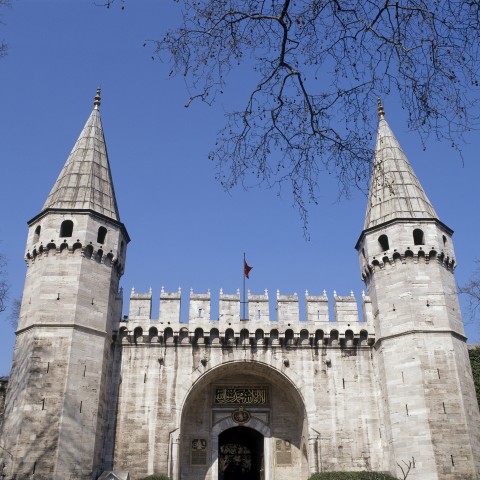
On the other hand, if you love learning about different types of handcrafts, you can study (and perhaps experience firsthand) the variety of handcrafts the Turkish people learned to perform throughout history. These include things like:
- Carpet and rug weaving
- Mother of pearl inlaid
- Filigree
- Ceramics and tiles
- Pottery making
- Marbling (ebru)
- Calligraphy
- Coppersmithing
- Miniature work
- Glass work
- Embroidery
- Leather tanning
- Meerschaum
- Xylography
Learning Turkish would allow you to study both the architecture and the handcrafts of Turkey in as much detail as you’d like!
8. Are you into international cuisine?
If you’re really into international food, then you must be aware of the reputation Turkish cuisine (which has been influenced by the Ottoman Empire) has made for itself. It’s known, in particular, for its variety and incredible flavors.
Another reason to learn Turkish, then, is that it will make traditional Turkish recipes more accessible to you and allow you to order food in Turkey with greater ease.
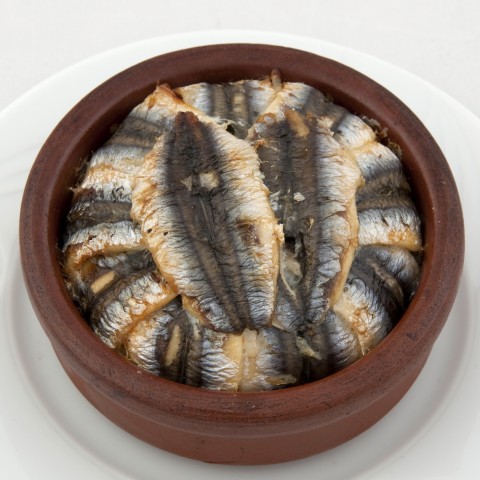
9. Are you a people person?
If you enjoy interacting with other people, especially those from different cultures, Turkish people should be one of your first choices. They’re known to be very friendly, talkative, helpful, and hospitable.
However, keep in mind that some Turkish people speak English and others do not. Therefore, in order to meet and communicate with a lot of Turkish people, you should consider learning at least a little Turkish.
10. Are you addicted to Turkish series and movies?
In the past decade, Turkish series and movies have grown in popularity. I have many friends from other countries who never miss an episode of certain Turkish series and ask me a lot of questions about them. If you’re anything like them, why don’t you start learning the Turkish language? Doing so will allow you to watch and listen to different forms of Turkish media in their original tones and language.

11. Why is Turkish Easy to Learn?
Now that we’ve discussed why to learn Turkish, there’s one more topic we should cover: Is Turkish easy to learn?
Well, Turkish grammar is a bit different from that of English, which intimidates some new learners. But overall, Turkish isn’t as difficult as you might think.
Let’s see why:
- Turkish uses the Latin alphabet. This is the alphabet used by the majority of languages worldwide, so you won’t have to learn completely from scratch. There might be additional letters or some letters that are missing when compared to some other languages that use this alphabet; you’ll just need to learn the pronunciation of any unfamiliar letters.
- There are no accents in Turkish. This is different from languages like French, where you have to remember whether the accent mark is to the left or to the right.
- Turkish has no grammatical gender.
- The word order in Turkish is flexible. The typical order is SOV (Subject-Object-Verb), which is different from English, but changing the order does not change the meaning of the sentence. If you put an object or a verb at the beginning of a sentence, for example, only the word you’re emphasizing will change. Therefore, in most circumstances, changing the word order is not a huge deal.
- There are many rules, but there are also very few exceptions. Therefore, if you learn the rules, mastering Turkish will be a piece of cake for you!
- There are many online resources. TurkishClass101 is the best resource to find everything you need.
12. Discover More About Turkish on TurkishClass101.com
In this article, we talked about why you should learn Turkish and gave you some examples of why this language really isn’t that hard to learn.
Have we inspired you to start (or continue) learning Turkish?
If so, bookmark TurkishClass101.com, where you can find numerous audio recordings, tons of vocabulary lists, and an array of free resources (including this Turkish dictionary you can refer to). It’s our goal to help you get a better grasp of the Turkish language and culture in the fastest and most fun way possible.
Don’t forget that there’s also MyTeacher, a Premium PLUS service of TurkishClass101 that allows you to study and practice with a private tutor.
You can download the TurkishClass101 app for free and use it wherever you are.
Happy learning!

The Top 30 Inspirational and Motivational Turkish Proverbs

I believe proverbs are an important part of any culture. Though we don’t know under what circumstances or by whom they were put forward, they have been passed down from one generation of people to another. They serve to teach us life lessons while showing us different points of view.
As a learner of the Turkish language, you’ll greatly benefit from studying Turkish proverbs and sayings. Doing so will expand your vocabulary, help you better understand the inner workings of the language, and provide you with insight into the core values and traditions of Turkish culture.
In this article, you’ll learn thirty inspirational and motivational Turkish proverbs with their English translations. We’ve categorized them by topic, so feel free to skim through and find a topic or theme that interests you!
- → By the way, to spice up your Turkish conversations even more, you may want to brush up on these Essential Idioms That Will Make You Sound Like a Native Speaker!
- Turkish Proverbs About Time
- Turkish Proverbs About Hope
- Turkish Proverbs About Friendship
- Turkish Proverbs About Happiness
- Turkish Proverbs About Trust
- Turkish Proverbs About Money
- Turkish Proverbs About Wisdom
- Miscellaneous Proverbs
- Learn More with TurkishClass101!
- …find yourself in the middle of a fascinating history.
- …be fascinated by the architecture dating back centuries.
- …become speechless because of the marvelous scenery.
- …taste the best food in the world.
- …be able to buy authentic items, spices, etc.
- …see its other face at night and enjoy the lively atmosphere at a nightclub.
- All About Istanbul!
- 10 Must-See Places in Istanbul
- Turkish Survival Phrases for Travelers
- Learn More with TurkishClass101!
- Istanbul is located in northwestern Turkey in the Marmara region.
- With 15.5 million residents, it’s the most populous city in Turkey and in all of Europe.
- It has a surface area of 2063 sq. mi (roughly 5343 sq. km).
- It’s a transcontinental city because the Bosphorus connects the Marmara Sea and the Black Sea. The Bosphorus also divides the city into two sides: European/Thracian and Asian/Anatolian.
- Istanbul is one of the oldest cities in the world. Its history goes back to about 2500 years ago. It has had many different names over the span of its history, two of which were Byzantium and Constantinople.
- It has served as the capital of four different empires: the Roman Empire between the years of 330-395, the Byzantine Empire between the years of 395-1204 and 1261-1453, the Latin Empire between 1204-1261, and finally the Ottoman Empire between 1453-1922.
- Most people think that Istanbul is still the capital of Turkey, but this is not true; Ankara is the current capital of Turkey.
- Istanbul has microclimates because of its size and various topographies. Furthermore, it’s inclusive of two different seas. It has oceanic and humid subtropical climates in the north part of the city and on the Bosphorus coast. It has Mediterranean climate in the south part of the city and on the Marmara Sea.
- While talking about climate, I can hear you asking, “What is the best time to visit Istanbul?” Perfect question. The best time to visit Istanbul is from March to May or from September to November, because the weather conditions are milder in those months.
- Istanbul is the center of trade and industry in the country due to its strategic location. It’s at an intersection of land and sea routes, which definitely keeps the trade and industry alive. Istanbul is the leading city of Turkey not only economically, but also historically and culturally.
- Istanbul has the highest number of English-speaking people in Turkey. You won’t have any communication problems in most hotels, restaurants, or shops. Places like Sultanahmet, Spice Bazaar, and Grand Bazaar have guides who speak English (and a few other languages).
- You must have a visa to visit Istanbul. It’s not a complicated process; you can apply for an e-visa.
- Make sure to have your passport with you at all times.
- Turkey’s currency is the Turkish Lira. There are exchange bureaus within the city, primarily at popular touristic areas. However, in order to get into the city from the airport, you’ll need some cash. Although you won’t get the best rates at the airport, you might want to exchange a small amount there.
- If you plan to visit Istanbul in winter, you might want to bring a small umbrella with you.
- Make sure to have a camera. I know we all have smartphones that have cameras, but you might prefer a more professional one that will help you immortalize the moment.
- Last but not least, I need to answer the most commonly asked question: “Is Istanbul safe to travel to?” Yes, Istanbul is mostly safe for travelers, but there are a few areas you need to stay away from (especially at night). Also, watch out for pickpockets at places like Taksim Square, Sultanahmet, the Grand Bazaar, and the Spice Bazaar.
- The Blue Mosque
- The Suleymaniye Mosque
- The Kılıç Ali Pasha Complex
- The Rustem Pasha Mosque
- The Chora Church (Kariye Museum)
- Rustem Pasha Mosque
- Eyup Sultan Mosque
- Fatih Mosque
- The Hippodrome
- Dolmabahçe Palace
- Museum of Turkish and Islamic Arts
- Carpet Museum
- Pera Museum
- Introduction to Turklish
- English Loanwords in Turkish
- English Words of Turkic Origin
- Words with Similar Spelling / Pronunciation (But Different Meanings)
- Famous People, Franchise, and Movie Names in Turkish
- Learn More with TurkishClass101!
- Check etmek – To check
- Feedback vermek – To give feedback
- Cool görünmek – To look cool
- Download etmek – To download
- Spoiler vermek – To give away a spoiler
- Mail göndermek – To send mail
- Print etmek – To print
- Save etmek – To save
- Login olmak – To login
- Logout olmak – To logout
- Register olmak – To register
- Password’ü unutmak – To forget password
- Post etmek – To post
- Nike
- Skechers
- Nine West
- Calvin Klein
- Levi’s
- McDonald’s
- Burger King
- Subway
- Starbucks
- Arby’s
- Johnny Depp
- Julia Roberts
- Clint Eastwood
- Halle Berry
- Core Values
- Ethnicity and Religion
- Traditions in the Flow of Life
- Social and Business Life
- Handcrafts and Art
- Traditional Turkish Holidays
- Other Cultural Highlights
- Final Thoughts
- Afghans
- Albanians
- Arabs
- Armenians
- Australians
- Azerbaijanis
- Bosniaks
- Bulgarians
- Circassians
- Crimean Tatars
- Dutch
- Georgians
- Germans
- Greeks
- Iranians
- Kazakhs
- Kyrgyz
- Levantines
- Russians
- Serbs
- Turkmens
- Uzbeks
- Carpet and rug weaving
- Mother of pearl inlaid
- Filigree
- Ceramics and tiles
- Pottery-making
- Marbling (ebru)
- Calligraphy
- Coppersmithing
- Miniature work
- Glass work
- Embroidery
- Leather tanning
- Meerschaum
- Xylography
- Republic Day (October 29)
- Youth and Sports Day (May 19)
- National Sovereignty and Children’s Day (April 23)
- Victory Day (August 30)
- Döner kebap. This is seasoned meat cooked on a vertical rotisserie.
- Yaprak sarma. This consists of grape leaves stuffed with spicy rice or spicy ground meat.
- Baklava. This famous Turkish dessert is something that I highly recommend.
 Table of Contents
Table of Contents
1. Turkish Proverbs About Time
Time is many things to us. It’s full of opportunity, it’s always running out, there’s never quite enough of it, and we’re always looking for the best ways to spend the time we do have. With this in mind, here are some Turkish proverbs about time:
| 1 | Turkish | Zaman her şeyin ilacıdır. |
| Literally | Time is the medicine of everything. | |
| Equivalent in English | Time is the best medicine. | |
| As time passes, all the troubles we experience are forgotten or the sorrow we feel decreases. Example: Üzülme, bugünler de geçecek; zaman her şeyin ilacıdır. “Don’t worry, these days will be over, too; time is the best medicine.” | ||
| 2 | Turkish | Sakla samanı, gelir zamanı. |
| Literally | Save the hay, its time will come. | |
| Equivalent in English | Keep a thing seven years and you’ll find a use for it. | |
| If you hold onto something you have for long enough, it will eventually become useful. Example: İyi ki kızımın bebek arabasını saklamışım, şimdi senin çok işine yarayacak. Eee, sakla samanı gelir zamanı. “Fortunately, I saved my daughter’s stroller. It will be very useful for you now. See, keep a thing for seven years and you’ll find a use for it.” | ||
| 3 | Turkish | Vakit nakittir. |
| Literally | Time is cash. | |
| Equivalent in English | Time is money. | |
| This proverb emphasizes that time is a valuable resource. Example: Bir an önce işe gitmeliyim. Eee, ne de olsa vakit nakittir. “I have to go to work as soon as possible. Well, after all, time is money.” | ||
| 4 | Turkish | Bugünün işini yarına bırakma. |
| Literally | Don’t leave today’s work for tomorrow. | |
| Equivalent in English | Never put off till tomorrow what you can do today. | |
| This one emphasizes that one should not delay doing something that can be done today. Example: Ödevimi yarın yaparım deyince babam bugünün işini yarına bırakma dedi. “When I said I would do my homework tomorrow, my father said ‘Never put off till tomorrow what you can do today.’ “ | ||
| 5 | Turkish | Sona kalan dona kalır. |
| Literally | The one who stays the last, is left for the frost. | |
| Equivalent in English | The devil takes the hindmost. | |
| The people who lag behind will either lose or not have any benefits. Example: Ali amca çocuklara şeker veriyor, koşun; sona kalan dona kalır. “Uncle Ali is giving candy to the children, run; the devil takes the hindmost.” | ||
| 6 | Turkish | Erken kalkan yol alır. |
| Literally | The one who gets up early proceeds. | |
| Equivalent in English | The early bird catches the worm. | |
| This proverb advises that if someone does something immediately (or before anyone else), he/she will have an advantage. Example: Daha 5 saatlik yolumuz var, artık yola çıksak iyi olur. Ne de olsa, erken kalkan yol alır. “We have five more hours to go, we’d better get going. After all, the early bird catches the worm.” | ||

2. Turkish Proverbs About Hope
We could all use some uplifting words now and then, especially when we’re at our lowest point. Whether you or a loved one needs some encouragement, these two Turkish proverbs about hope will deliver!
| 7 | Turkish | Çıkmadık candan umut kesilmez. |
| Literally | If the person didn’t die, there is still hope. | |
| Equivalent in English | While there’s life, there’s hope. | |
| If something didn’t fail completely, there is still a chance to save it. Example: Üzülme, son aday henüz açıklanmadı. Çıkmadın candan umut kesilmez. “Don’t worry, the last candidate has not been announced yet. While there’s life, there’s hope.” | ||
| 8 | Turkish | Gün doğmadan neler doğar. |
| Literally | Before the sun rises, a lot of things rise. | |
| Equivalent in English | Tomorrow is another day. | |
| A person should never lose hope, because nobody knows what’s going to happen tomorrow. Example: Öyle hemen umudunu kaybetme. Gün doğmadan neler doğar. “Don’t lose your hope. Tomorrow is another day.” | ||
3. Turkish Proverbs About Friendship
A true friendship is one of the most precious things a person can experience—and a fake or weak friendship can be one of the worst things! The following Turkish proverbs about friendship offer advice on how to choose friends wisely and how to be a good friend yourself.
| 9 | Turkish | Bana arkadaşını söyle sana kim olduğunu söyleyeyim. |
| Literally | Tell me who your friend is, I will tell you who you are. | |
| Equivalent in English | Tell me who you go with, and I’ll tell you who you are. | |
| This proverb means that a person’s friends are a reflection of who he/she is. Example: John o gruba girdiğinden beri her gün kavga ediyor. Eee, ne demişler ‘Bana arkadaşını söyle sana kim olduğunu söyleyeyim.’ “Since John got into that group, he’s been fighting every day. Well, they say, ‘Tell me who you go with, and I’ll tell you who you are.’ ” | ||
| 10 | Turkish | Dost kara günde belli olur. |
| Literally | A real friend is understood on a bad day. | |
| Equivalent in English | A friend in need is a friend indeed. | |
| A person who stays by your side during difficult times is someone you can really rely on. Example: İflas ettiğinden beri Mary dışında hiçbir arkadaşı yanında değil. Eee, dost kara günde belli olur. “Since she went bankrupt, none of her friends are with her except for Mary. Well, a friend in need is a friend indeed.” | ||

| 11 | Turkish | Dost acı söyler. |
| Literally | Real friend talks bitter. | |
| A real friend always tells the truth—including when their friend is wrong—even if it hurts. Example: Kusura bakma bu olayda sen hatalısın; dost acı söyler. “Sorry, in this case you are wrong; real friend talks bitter.” | ||
4. Turkish Proverbs About Happiness
We all desire happiness, but there are days when it seems impossible to find. Below are a couple of Turkish proverbs about happiness that provide insight on the topic.
| 12 | Turkish | Kutlu gün doğuşundan bellidir. |
| Literally | A happy day is known from the way of the sunrise. | |
| The affairs that will lead to happy and good results manifest themselves from the beginning. Example: Başından beri her şey o kadar iyi gitti ki, işi senin alacağını biliyordum. Büyüklerin dediği gibi: ‘Kutlu gün doğuşundan bellidir.’ “Everything went so well from the start that I knew you would get the job. As the elderly say: ‘A happy day is known from the way of the sunrise.’ “ | ||
| 13 | Turkish | Ulu ağacın gürültüsü dal ile, mutlu evin yakışığı döl ile. |
| Literally | The noise of the great tree with the twig, the light of the happy house with the offspring. | |
| Just as a tree grows by branching, the happiness of a family is reinforced by the children it raises. Example: Onlar çok kalabalık bir aile. Eee, ne de olsa Ulu ağacın gürültüsü dal ile, mutlu evin yakışığı döl ile. “They are a very crowded family. Well, after all, the noise of the great tree with the twig, the light of the happy house with the offspring.” | ||

5. Turkish Proverbs About Trust
Knowing who (or what) to trust is an important skill to have, but it can also be one of the most difficult things to determine. To give you a bit of advice on the matter, here are a couple of Turkish proverbs about trust.
| 14 | Turkish | Güvenme varlığa, düşersin darlığa. |
| Literally | Don’t trust wealth, you would fall into poverty. | |
| People should not be extravagant with their spending if they have a lot of money. If they don’t manage their money properly, they can find themselves in poverty. Example: Paranı çarçur etme; ne derler ‘Güvenme varlığa, düşersin darlığa.’ “Don’t waste your money; they say, ‘Don’t trust wealth, you would fall into poverty.’ “ | ||
| 15 | Turkish | Güvenme dostuna, saman doldurur postuna. |
| Literally | Do not trust your friend, he/she will fill your skin with hay. | |
| This proverb implies that before you trust someone, you should test him/her. If you trust someone blindly, he/she might deceive you. Example: Sen herkese çok güveniyorsun. Şu atasözünü hiç duymadın mı? ‘Güvenme dostuna, saman doldurur postuna.’ “You trust everyone very much. Have you ever heard of this proverb? ‘Do not trust your friend, he/she will fill your skin with hay.’ “ | ||
6. Turkish Proverbs About Money
As we all know, every language has plenty of quotes and proverbs about money and how to use it wisely. Below are some famous Turkish proverbs about money.
| 16 | Turkish | Parayı veren düdüğü çalar. |
| Literally | The one who gives the money blows the whistle. | |
| Equivalent in English | He who pays the piper calls the tune. | |
| The one who pays for something is the one who has a say in related matters. Example: Sen de ona para verseydin, sana da dondurma getirirdi; parayı veren düdüğü çalar. “If you had given him money, he would have brought you ice cream, too; who pays the piper calls the tune.” | ||
| 17 | Turkish | Para parayı çeker. |
| Literally | Money draws money. | |
| Equivalent in English | Them as has, gits. | |
| If someone has money, he/she can make more money with it since money brings more advantages and opportunities. Example: Jane lotoyu tutturmuş. Eee para parayı çeker. “Jane has won the lottery. Well, them as has, gits.” | ||
| 18 | Turkish | Ekmek aslanın ağzında. |
| Literally | Bread is in the mouth of the lion. | |
| Equivalent in English | Money doesn’t grow on trees. | |
| This proverb means that it’s not easy to earn money; it requires a lot of effort. Example: Paranı çarçur etmemelisin. Malum, ekmek aslanın ağzında. “You shouldn’t waste your money. As you know, bread is in the mouth of the lion.” | ||
| 19 | Turkish | Para ile imanın kimde olduğu bilinmez. |
| Literally | It’s not known who has money or faith. | |
| Faith is something within the heart of a person, so we don’t know who really has faith in God. Likewise, we really don’t know how much money a person has. Example: Joe amcanın 10 milyon dolar miras bırakmasına çok şaşırdım. Para ile imanın kimde olduğu bilinmez. “I was surprised that Uncle Joe left a legacy of ten million dollars. It’s not known who has money or faith.” | ||
| 20 | Turkish | Para insana dil, elbise insana yol öğretir. |
| Literally | Money teaches man a language, clothes teach the way. | |
| Your wealth and position determine your place in society, and can give you more or less prestige than others. Example: O adamı lotoyu kazanana dek hiç kimse sevmezdi. Şimdi etrafında bir sürü insan var. Eee, para insana dil, elbise insana yol öğretir. “Nobody liked that man until he won the lottery. Now there are a lot of people around him. Well, money teaches man a language, clothes teach the way.” | ||

7. Turkish Proverbs About Wisdom
Wisdom is another concept that people in every culture talk a lot about. Below are a few great Turkish proverbs that offer general words of wisdom for many of life’s circumstances.
| 21 | Turkish | Akıl akıldan üstündür. |
| Literally | One mind is better than another one. | |
| Equivalent in English | Two heads are better than one. | |
| We can’t know it all. It’s good to ask for other people’s opinions, because they may have better ideas than we do. Example: Sana da sorayım. Ne de olsa akıl akıldan üstündür. Sence ona nasıl davranmalıyım? “Let me ask you as well. After all, two heads are better than one. How do you think I should treat him/her?” | ||
| 22 | Turkish | Akıl yaşta değil baştadır. |
| Literally | Wisdom isn’t at age, it’s on the head. | |
| Equivalent in English | Wisdom doesn’t come with age. | |
| A person doesn’t need to be old in order to think wisely, or to realize what’s going on. Using one’s brain and learning from experience leads to wisdom. Therefore, a person is not wise just because they’re old; a person who is young may also be wise. Example: Çok genç ve tecrübesiz olmasına rağmen durumu iyi idare etti. Ne de olsa, akıl yaşta değil baştadır. “Although he is very young and inexperienced, he managed the situation well. After all, wisdom doesn’t come with age.” | ||
| 23 | Turkish | Akla gelmeyen başa gelir. |
| Literally | The one that doesn’t come to mind, happens. | |
| Equivalent in English | The unexpected always happens. | |
| We shouldn’t forget that things can happen, even if we don’t expect or foresee them. Example: Kapının önünde zili tamir ediyordum. Kapı açık diye anahtarımı almadım. Bir rüzgar esti, kapı kapandı. Akla gelmeyen başa geliyor. “I was fixing the bell in front of the door. I didn’t get my key because the door was open. The wind blew, the door got closed. The unexpected always happens.” | ||

| 24 | Turkish | Akıllı düşmandan değil; salak dosttan kork. |
| Literally | Be afraid of a stupid friend, not of a smart enemy. | |
| People who act thoughtlessly, do not see the truth, and cannot see the consequences of the words they say, may unknowingly harm their friends—even if they have good intentions. On the other hand, we can anticipate and predict what a smart enemy can do and take precautions. Example: En iyi arkadaşım patavatsızca konuşup, beni zor durumda bıraktı. Akıllı düşmandan değil; salak dosttan kork. “My friend talked thoughtlessly and put me in a difficult situation. Be afraid of a stupid friend, not of a smart enemy.” | ||
| 25 | Turkish | Cahile söz anlatmak, deveye hendek atlatmaktan güçtür. |
| Literally | It is more difficult to speak to an ignorant person than to get a camel over a ditch. | |
| Equivalent in English | Like getting blood from a turnip. | |
| This proverb means that it’s impossible to explain something to an ignorant person. Example: Hepimiz en az üç kez anlattık ama anlamadı. Cahile söz anlatmak, deveye hendek atlatmaktan güç. “All of us told him at least three times, but he didn’t understand. It’s like getting blood from a turnip.” | ||
8. Miscellaneous Proverbs
To wrap up, let’s look at some of the best Turkish proverbs on a variety of other concepts!
| 26 | Turkish | Olacakla öleceğe çare yoktur. |
| Literally | There is no cure for the things that will happen or the person that will die. | |
| Equivalent in English | Whatever will be, will be. | |
| We can’t control everything. Whatever is meant or predetermined to take place will take place. Example: O kadar uğraştım ama yine de olmadı. Anladım ki olacakla öleceğe çare yok. “I tried so hard, but it still didn’t happen. I realized that whatever will be, will be.” | ||
| 27 | Turkish | Lafla peynir gemisi yürümez. |
| Literally | The cheese ship doesn’t move with words. | |
| Equivalent in English | Actions speak louder than words. | |
| This one means that nothing happens when we only talk about it; action is needed. In other words, what you do is more important than what you say. Example: O hep konuşuyor, hiçbir şey yaptığı yok ama lafla da peynir gemisi yürümez. “He/she always talks, he/she does nothing, but actions speak louder than words.” | ||
| 28 | Turkish | Komşunun tavuğu komşuya kaz görünür. |
| Literally | The neighbor’s chicken seems like a goose to the neighbor. | |
| Equivalent in English | The grass is always greener on the other side of the fence. | |
| This proverb means that what other people have always seems better than what we have. Example: Sally Jen’in elbisesini çok beğendi. Halbuki aynısı onda da var. Komşunun tavuğu komşuya kaz görünür. “Sally liked Jen’s dress very much. However, she has the same dress. The grass is always greener on the other side of the fence.” | ||
| 29 | Turkish | Sütten ağzı yanan yoğurdu üfleyerek yer. |
| Literally | The one who is burnt by the milk, eats yogurt by blowing on it. | |
| Equivalent in English | Once burnt, twice shy. | |
| If someone has had an unpleasant experience in the past, they become more cautious. Example: O hemen David’in evlenme teklifini kabul etmek istemiyor. Eee, sütten ağzı yanan yoğurdu üfleyerek yer. “He doesn’t want to accept David’s marriage proposal right away. Well, once burnt, twice shy.” | ||
| 30 | Turkish | Altın pas tutmaz. |
| Literally | Gold doesn’t get rusted. | |
| Nobody can dishonor someone who is honorable and dignified. Example: O ne derse desin, herkes beni biliyor. Altın pas tutmaz. “No matter what he/she says, everyone knows me. Gold does not get rusted.” | ||
9. Learn More with TurkishClass101!
In this article, we went over a bunch of Turkish proverbs with their English translations. Now you can impress your Turkish friends, colleagues, or even your boss by using these popular Turkish proverbs at the right moment.
Would you like to continue your Turkish studies in the fastest, easiest, and most fun way possible? Then bookmark TurkishClass101.com! We provide numerous video and audio lessons, tons of vocabulary lists, and a number of free resources (such as this Turkish dictionary), all designed to help you get a better grasp of the language. We also provide the MyTeacher service for Premium PLUS members; this service allows you to work and practice one-on-one with your own personal language tutor.
Interested? You can download the app for free and use it wherever you are.
Happy learning!

Istanbul Travel Guide: The Best Places to Visit in Istanbul

Hello, everyone! Are you all ready for a tour of Istanbul? I’m your Istanbul travel guide, and as your guide, I can guarantee that every single one of you will find an activity you’re interested in.
Do you love history or architecture? Are you a nature-lover? Are you traveling just to enjoy the beautiful scenery? Do you like partying and nightlife? Are you into shopping? Do you enjoy trying different cuisines?
Even if you answered “yes” to all of these questions, you’ll be able to find your every point of interest in Istanbul.
It’s a magical city where you’ll…
Have we given you enough reasons to visit Istanbul? Great! Read on to learn everything you need to know before packing your bags.
 Table of Contents
Table of Contents
All About Istanbul!

General Information
To kick off our Istanbul visit guide, here’s some general information you should know about the city before packing your bags.
Istanbul Travel Tips
Here are some essential tips on how to visit Istanbul—and how to prepare beforehand—for the best possible experience.
10 Must-See Places in Istanbul
Because there are so many unique sights and experiences in Istanbul, it can be difficult to know which places you should prioritize during your stay. In this section, we’ll introduce you to the very best places to visit in Istanbul. Let’s get to it!
1 – Hagia Sophia (Ayasofya Camii)
Hagia Sophia was built in 537 during the reign of the Roman Emperor Justinian I. He employed the talent of Greek geometers to design the place, which was meant to serve as a Christian cathedral. However, in 1453, Mehmet the Conqueror had the cathedral converted into a mosque.
This work of art was the inspiration for other mosques, including:
It was restored a couple of times over the years.
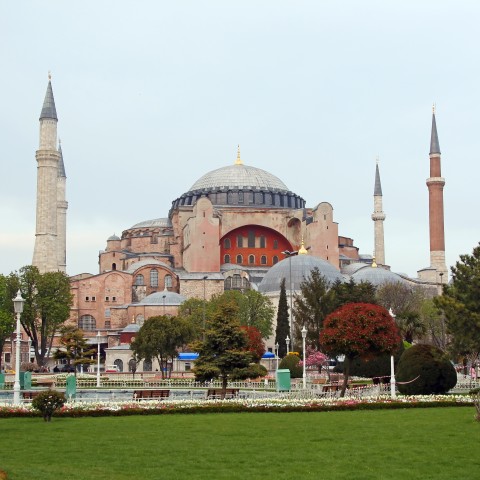
In 1931, the mosque became closed off to the public before reopening as a museum in 1935. This reopening was accomplished via the efforts of Mustafa Kemal Ataturk, the founder of the Turkish Republic.
According to the statistics provided by the Turkish Ministry of Culture and Tourism, Hagia Sophia was Turkey’s most-visited tourist place in 2015 and 2019. It was also placed on World Monuments Watch in 1996 and 1998.
In 2006, it became forbidden to use the Hagia Sophia as a place of worship, either as a mosque or a church. A small room was reserved for the Christian and Muslim staff to use as a prayer room.
There has been a lot of pressure from other world countries to convert it back to a church. Contrary to this, a new decision has very recently been made by the Council of Ministers to revert it to a mosque. It’s been said that the mosaics in the building will be preserved, but they will be covered with curtains, carpets, etc. during the prayers. It has also been declared that the doors of Hagia Sophia will always remain open to all Muslims and non-Muslims.
After this change, UNESCO will be re-evaluating the status of Hagia Sophia, which was on the World Heritage List.
2 – Topkapi Palace (Topkapı Sarayı)
Topkapi Palace is the palace where the Ottoman Empire was managed for about 400 of its 600 years. It’s also where the sultans lived and could accommodate about 4000 people at a time. Mehmet the Conqueror ordered its construction and it was built in 1478.
It was first used as a museum in 1924. When first established, it was on an area of approximately 700,000 m²; it now has an area of only 80,000 m².
It consists of hundreds of rooms and chambers, some of which are not open to visitors. A couple of the most interesting parts that are open to the public include the Ottoman Imperial Harem (where the sultan’s family would spend the day) and the treasury where the Spoonmaker’s Diamond and the Topkapi Dagger are displayed.
The palace has many amazing Islamic art pieces, hand-painted tiles, splendidly decorated rooms, and safeguarded towers. Is that all? Of course not! You’ll also find Ottoman garments, weapons, miniatures, and Islamic relics on display. Also, don’t forget to see the illuminated manuscripts (such as the Topkapi manuscript).
The palace is located within the Historic Areas of Istanbul, which was recognized by UNESCO as a World Heritage Site in 1985.
3 – Basilica Cistern (Yerebatan Sarnıcı)
This is the largest ancient cistern in Istanbul, and it’s located 490 feet (150 meters) southwest of the Hagia Sophia on the European side of Istanbul. It was built in the sixth century by the order of Byzantine Emperor Justinian I. There was previously a basilica located here, hence the name Basilica Cistern.
As one of the most fascinating museums in Istanbul, the Basilica Cistern has a ceiling supported by 336 marble columns and today has little water because it’s open to the public. There are two Medusa heads used as the bases of two columns. One head is sideways and the other one is upside-down. There’s no written record concerning these two Medusa heads.
The cistern is not only used as a museum, but also hosts many national and international events.
It was used as a location in the 1963 James Bond film From Russia with Love and was also featured in other movies. Furthermore, it was the subject of Dan Brown’s novel, Inferno.
Just a reminder: If you have asthma, it might not be suitable for you to visit this wonderful place due to the high humidity.
4 – Blue Mosque (Sultan Ahmet Camii)
The Blue Mosque was built between the years of 1609 and 1616 during the reign of Ahmet I. It’s located next to Hagia Sophia and is regarded as the last great mosque of the classical era.
It contains the tomb of Ahmet, a madrasah (a word which refers to any kind of educational institution), and a hospice. It’s called the Blue Mosque because its interior walls are decorated with hand-painted blue tiles. It has five major domes, six minarets, and eight secondary domes.

Its upper area is adorned with 20,000 hand-painted glazed ceramic tiles with sixty different tulip designs. The lower areas have 200 stained glass windows that are illuminated.
Many of the lamps inside the Blue Mosque were coated with gold and gems, but all of those items have either been taken out or stolen.
Pope Benedict XVI visited this mosque in 2006. It was considered an important event because this was only the second time in history that a pope visited an Islamic place of worship.
5 – Mosque of Suleyman the Magnificent (Süleymaniye Camii)
This mosque was ordered to be built by the Ottoman sultan Suleyman. Built at the highest end of the city to aggrandize the sultan, it was completed in 1557 by Mimar Sinan—the best engineer and architect of the time.
It has four minarets with ten galleries, representing that Suleyman the Magnificent was the tenth sultan of the Ottoman Empire.
It’s actually a complex that also has religious and cultural structures. Originally, it had the mosque, a hospital, public baths (hamam), a primary school, four Qur’an schools, a medical college, a Caravanserai, and a public kitchen where the poor people were served food. Many of these structures still exist, though the public kitchen is now a well-known restaurant and the hospital is the Turkish Army’s factory. Outside the mosque, you’ll also find the tomb of Mimar Sinan.
6 – Yedikule Fortress (Yedikule Zindanları or Yedikule Hisarı)
Yedikule Fortress means “Fortress of the Seven Towers.”
The Byzantine Emperor Theodosius wanted to welcome his visitors (kings, etc.) elegantly, so he wanted a Golden Gate to be built. His son, who inherited the throne after the death of Theodosius, had four towers built and had them combined with the Golden Gate.
After the conquest of Istanbul, three more towers were built at the order of Fatih Sultan Mehmet. Every one of these towers has a name.
Unfortunately, only some of the fortresses still exist today. There are about seventeen pieces (cannonballs, marble columns, etc.) displayed outdoors.
7 – The Galata Tower (Galata Kulesi)
Built in 1348 as Christea Turris (Tower of Christ in Latin), this is a high, cylindrical medieval stone tower that is cone-capped. It was the city’s tallest structure when it was built.
It underwent several restorations before becoming open to the public in 1960.
There are two elevators you can take to the upper levels, where there’s a restaurant and a café. The panoramic view of Istanbul and the Bosphorus from here is spectacular. There’s also a nightclub where you can watch a Turkish show and have a great time.
8 – Cruise the Bosphorus
If you would like to see more of Istanbul, you can have a cruise on the Bosphorus. Boats leave in the mornings and go toward the Black Sea. You can have your lunch at Anadolu Kavagi before walking up the hill to Yoros Castle for an amazing view. Just relax and enjoy the beauty of Istanbul!
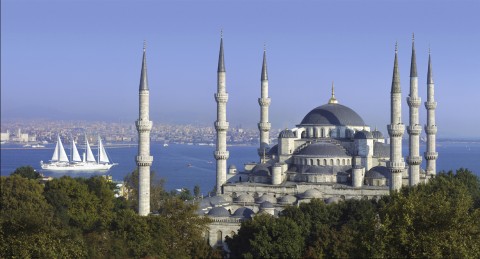
9 – Grand Bazaar (Kapalıçarşı)
The Grand Bazaar is one of the largest covered markets the world over, and one of the oldest. As a matter of fact, it’s considered the first shopping mall in the world. Today, it’s one of the most famous attractions in Istanbul. It includes 61 covered streets, more than 4000 shops, and 26,000 employees.
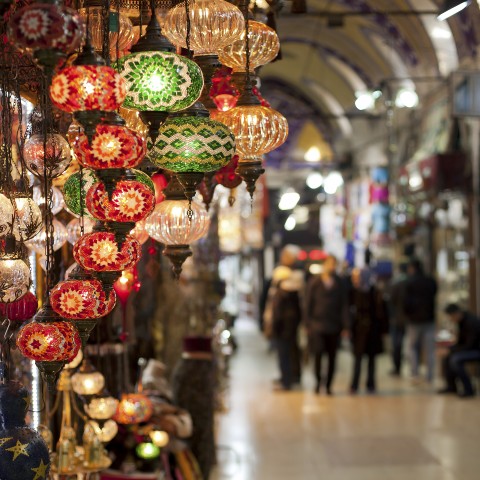
Its construction began not long after the conquest of Istanbul, in an attempt to revive the city’s economy.
For the past couple of years, the Grand Bazaar has been undergoing restoration.
10 – Spice Bazaar (Mısır Çarşısı)
The Spice Bazaar is the second most popular covered shopping area after the Grand Bazaar. You can buy Turkish delight, dried fruits, nuts, herbs, olives, and different kinds of spices. It now has a total of 85 shops in it.
There’s also a mosque called New Mosque (Yeni Camii) next to the bazaar. You might want to visit it while you’re in the area, so you can admire its tile-work and gold leaves.
Bonus
It’s impossible to talk about every point of attraction in Istanbul in just one article. But I did want to mention a few more places to visit in Istanbul if you have time:
In addition to these, you should also visit Ortakoy (a popular neighborhood) and Istiklal Street (a famous street of Istanbul).
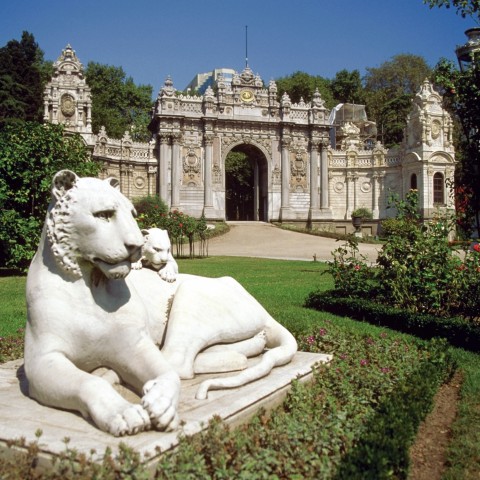
Turkish Survival Phrases for Travelers
Here are a few words and phrases that will help you communicate with locals while you visit Istanbul.
| English | Turkish |
| Hello. | Merhaba. |
| Goodbye. | Hoşçakalın. |
| Please. | Lütfen. |
| Thank you. | Teşekkür ederim. |
| Excuse me. | Afedersiniz. |
| Do you speak English? | İngilizce biliyor musunuz? |
| Can you help me? | Bana yardım edebilir misiniz? |
| I don’t understand you. | Sizi anlamıyorum. |
| Where is the restroom? | Tuvalet nerede? |
| How much is this? | Bu ne kadar? |
Learn More with TurkishClass101!
I hope this Istanbul travel guide gave you a much better idea of what to expect from this beautiful city and which spots you should definitely see. However, there’s still a lot more to know about the city, country, culture, and language!
You can get practical information on all these things by visiting TurkishClass101.com. We provide numerous audio recordings, tons of vocabulary lists, and free resources (including a Turkish-English dictionary you can refer to). In addition, our Premium PLUS members have access to MyTeacher—a feature that allows you to learn and practice with your very own personal tutor.
Interested? You can download the app for free and use it wherever you are.
By the way, which of these Istanbul locations are you most interested in seeing, and why? We look forward to hearing from you!

Are There Any English Words Used in Turkish?

When we’re learning a new language, it’s always a relief to find out that our target language uses a bunch of words from our native tongue.
The good news for you is that there are plenty of English words used in Turkish! Memorizing these words can give you a huge vocabulary boost with very little effort on your part and make the Turkish language seem a little less daunting.
In this article, you’ll learn about the most common English words in Turkish as well as the language phenomenon known as Turklish. We’ll even introduce you to several English words borrowed from Turkish to show you how deep the vocabulary exchange is between these two languages.
Let’s get started.
 Table of Contents
Table of Contents
Introduction to Turklish
Although we will mainly talk about loanwords in this article, we’ll start by introducing you to the concept of Turklish (Türkilizce). This refers to native Turkish speakers using a mixture of Turkish and English words when speaking.
As we all know, English is the dominant language in almost all aspects of life, from science to technology. Hollywood movies have undoubtedly played a role in spreading the influence of English even farther.
There are around two million Turkish people living and studying in English-speaking countries such as the U.S.A., Canada, the U.K., and Australia. These people often use a combination of Turkish and English when communicating with each other—a phenomenon that came to be known as Turklish in 1994. Furthermore, it’s common for Turks who also speak English to use Turklish in corporate or international companies in Turkey.

Of course, Turkish linguists are opposed to the use of Turklish. They say it ruins the Turkish language and that people, especially those who use this new language hybrid within Turkey, do so just to evoke admiration and to sound more knowledgeable than they really are.
Here are a few examples of Turklish:

English Loanwords in Turkish
With the progress of technology and the growing popularity of social media, the use of English seems inevitable—even in countries where English is not an official language.
Aside from Turklish phrases like those mentioned above, there are also borrowed English words in the Turkish language that retain their original (or a similar) meaning and spelling. But while these words may look similar on paper, they’re normally pronounced according to Turkish phonology.
A lot of Turkish people (especially the younger generations) love to use these loanwords. Some might even do so because they think it will make them sound cool. However, linguists are not very happy about this situation.
Can you guess what any of these loanwords are? Let’s take a look.
Loanwords spelled exactly the same way
The list of English loanwords in Turkish is pretty long. The examples below have exactly the same meaning and spelling as their English counterparts, but the majority of them are pronounced differently.
Please note that on our list, you may also notice a few words that are not originally English—such as sauna (Finnish) and yoga (Sanskrit)—but which have become an integral part of the language over time.
| Atom | Holding | Mini | Plan | Silo |
| Bar | Ideal | Minimum | Poker | Salon |
| Banker | Jet | Net | Pop | Siren |
| Bravo | Kilogram | Normal | Printer | Slogan |
| CV | Laptop | Modern | Problem | Spiral |
| Depo | Latin | Motel | Program | Tablet |
| Diploma | Lens | Online | Protein | Taboo |
| Fan | Liberal | Organ | Radar | Tank |
| Film | Limit | Oval | Real | Trend |
| Final | Link | Park | Reform | TV |
| Form | Market | Partner | Risk | Video |
| Global | Metal | Patent | Robot | Vitamin |
| Gram | Meteor | Pedagog | Sauna | Yoga |
| Hamburger | Midi | Pilot | Set | Zebra |
Loanwords spelled differently
Below is a list of English words in the Turkish language with slightly different spellings than their English counterparts.
| English | Turkish | English | Turkish |
| Abnormal | Anormal | Active | Aktif |
| Academy | Akademi | Adaptation | Adaptasyon |
| Acetone | Aseton | Address | Adres |
| English | Turkish | English | Turkish |
| Action | Aksiyon | Advocate | Avukat |
| Actor | Aktör | Balcony | Balkon |
| Acid | Asit | Balloon | Balon |
| Acne | Akne | Bank | Banka |
| Bazaar | Pazar | Laser | Lazer |
| Cake | Kek | Mask | Maske |
| Card | Kart | Material | Materyal |
| Catalog | Katalog | Mission | Misyon |
| Comic | Komik | Negative | Negatif |
| Dance | Dans | Obese | Obez |
| Diesel | Dizel | Office | Ofis |
| Diet | Diyet | Panic | Panik |
| Discipline | Disiplin | Party | Parti |
| Editor | Editör | Project | Proje |
| Elastic | Elastik | Reference | Referans |
| Empathy | Empati | Score | Skor |
| Factor | Faktör | Service | Servis |
| English | Turkish | English | Turkish |
| Filter | Filtre | Technic | Teknik |
| Group | Grup | Tour | Tur |
| Hobby | Hobi | Unit | Ünite |
| Honor | Onur | University | Üniversite |
| Industry | Endüstri | Vision | Vizyon |
| Inventory | Envanter | Version | Versiyon |
| Jury | Jüri | Yacht | Yat |
| Kangaroo | Kangru | Zeppelin | Zeplin |
English Words of Turkic Origin
Now, let’s see the other side of the coin! This language exchange has gone in both directions, and there are several English words from Turkish.
Here are some Turkish words in the English language that have exactly the same meaning in both languages:
| English | Turkish | English | Turkish | English | Turkish |
| Aga/Agha | Ağa | Doner Kebab | Döner Kebap | Pastrami | Pastırma |
| Ayran | Ayran | Fez | Fes | Pilaf | Pilav |
| Bairam | Bayram | Kaftan | Kaftan | Seljuk | Selçuk |
| Baklava | Baklava | Kalpak | Kalpak | Shaman | Şaman |
| English | Turkish | English | Turkish | English | Turkish |
| Balkan | Balkan | Khan | Han | Shish Kebab | Şiş Kebap |
| Boza | Boza | Kismet | Kısmet | Tughra | Tuğra |
| Bulgar | Bulgar | Kurbash | Kırbaç | Turk | Türk |
| Bulgur | Bulgur | Kurus | Kuruş | Yogurt/Yoghurt | Yoğurt |
| Dolmush | Dolmuş | Pasha | Paşa | Yurt | Yurt |
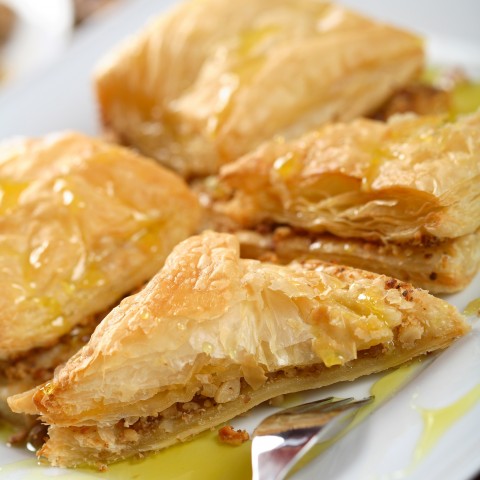
Words with Similar Spelling / Pronunciation (But Different Meanings)
Now let’s cover another interesting concept: words that are spelled or pronounced the same way in English and Turkish, but have completely different meanings. Learning these might help you remember certain Turkish words more easily!
Same Spelling, Different Meanings
The only thing these words have in common is that they’re spelled the same way in both languages. Other than that, their pronunciation (in most cases) and their meanings are different.
| English/Turkish | Meaning in Turkish | English/Turkish | Meaning in Turkish |
| An | Moment | Mum | Candle |
| At | Horse | Nine | Grandma |
| Can | Life | On | Ten |
| Cam | Glass | Pat | Aster |
| English/Turkish | Meaning in Turkish | English/Turkish | Meaning in Turkish |
| Fare | Mouse | Post | Fleece |
| Gel | Come | Pot | Blunder |
| Gem | Bit | Saf | Pure |
| Gene | Again | Seven | Loving |
| Ham | Raw | Son | Final/Last |
| Hat | Line | Sun | Offer |
| Her | Every | Sure | Sura |
| His | Feeling | Tan | Dawn |
| Men | Preclusion | Ten | Skin |
| Mine | Enamel/Verbena | Top | Ball |
Same Pronunciation, Different Meanings
The following words are pronounced the same way, but have different meanings and spellings:
| English | Turkish | Meaning in Turkish | English | Turkish | Meaning in Turkish |
| Car | Kar | Snow | Pick | Pik | Peak |
| Cut | Kat | Floor/Layer | Tape | Teyp | Stereo/Cassette Recorder |
| English | Turkish | Meaning in Turkish | English | Turkish | Meaning in Turkish |
| Cup | Kap | Container | Tick | Tik | Twitch/Teak |
| I | Ay | Moon | Top | Tap | Worship/Adore |
Famous People, Franchise, and Movie Names in Turkish
All proper names are written in Turkish just as they are in English, though they may be pronounced differently. Examples include:
Brand Names
Food Chains
Celebrities

Series and movie names, however, are usually translated into Turkish. This is probably for commercial reasons, as marketers try to come up with Turkish names that will appeal to the culture and draw more attention so they can get higher ratings and make more money.
Here are some examples you might find interesting:
| Name of the movie | Translated into Turkish |
| Mission Impossible | Görevimiz Tehlike (Our Mission is Danger) |
| Two for the Money | Kirli Para (Dirty Money) |
| A Beautiful Mind | Akıl Oyunları (Games of the Mind) |
| Rush Hour | Bitirim İkili (Crack Couple) |
| Sliding Doors | Rastlantının Böylesi (Such a Coincidence) |
| Name of the movie | Translated into Turkish |
| Sweet November | Kasım’da Aşk Başkadır (Love is Different in November) |
| Good Will Hunting | Can Dostum (My Best Friend) |
| Suicide Squad | Gerçek Kötüler (Real Villains) |

Learn More with TurkishClass101!
Now that you’ve learned all of these English words used in Turkish, we hope that learning the language won’t be so daunting for you anymore. To make your language learning process even smoother and more worry-free, continue exploring TurkishClass101.com!
We provide an array of practical learning materials, including numerous audio recordings, tons of vocabulary lists, and free resources (including our Turkish-English dictionary). It’s our aim to help you master the language and get a feel for the culture.
Don’t forget that you can also sign up for a Premium PLUS account to use our MyTeacher service, which will allow you to learn and practice with a private teacher.
Best of all, you can download the app for free and use it wherever you are.
Before you go, let us know in the comments if any of the words on our list surprised you or if you have any questions. We look forward to hearing from you!

A Brief Overview of Turkish Culture and Traditions

Turkey is a country straight from the depths of history, with empires dating back 4000 years. The course of time and events has introduced Turkey to a range of peoples and cultures, lending this great country a rich culture full of unique traditions and customs.
In this lesson, you’re going to learn all about Turkish culture and traditions. We promise this will be a very colorful, out-of-the-ordinary experience for you!
 Table of Contents
Table of Contents
1. Core Values
I believe every culture promotes core values such as honesty, justice, fairness, equality, and so on. However, most of these values are dependent upon the conscience, one’s inner person—there will always be people who stick to these values and those who don’t. Of course, these are only exceptions to the rule.
In addition to these common core values, there are others that may be unique within a country or central to its identity.
For example, elderly people have a special place in Turkish people’s lives and are treated with great respect. The concept of family is considered sacred and neighborliness is very important. Relations with neighbors are so close and sincere that it’s very common for a neighbor to knock on another’s door and ask if they have a cup of sugar or flour to give him or her.
In Turkish culture, hospitality is another distinguished value. Especially in rural areas, the host or hostess will share their last slice of bread with a stranger. They love offering food and drinks to friends, neighbors, acquaintances, and even strangers. They also love to help people in need, whether individually or as a nation. When a disaster happens somewhere, people start donating money, sending equipment, and so on, without hesitation.
Most Turkish women are obsessed with the cleanliness of their houses. They have to be clean all the time. If you ever visit a Turkish home, don’t forget to take your shoes off. Most families will expect you to do so!
There is a strong sense of patriotism in the country. This shouldn’t be a surprise, since we have a great role model: Atatürk, one of the best leaders of all time. Turks always try to be loyal to their historical heritage.
The Turkish flag and the national anthem are highly respected. The flag is never put on the floor or the ground and whenever the national anthem is sung somewhere, people passing by will stop, stand by attention, sing along, and continue on their way when it’s over.

2. Ethnicity and Religion
Turkish culture and customs are largely influenced by the country’s ethnic diversity, as well as the strong religious nature of the Turkish people. Take a look.
A- Ethnicity
Considering that Turkish history goes back thousands of years—and that the Ottoman Empire, which controlled Southeastern Europe, some parts of Eastern Europe, Western Asia, and Northern Africa, played a role in recent history—it’s not surprising that Turkey is home to many ethnicities. 75% of its population consists of Turks, 18% consists of Kurds, and the remaining 17% consists of other ethnic groups, which include:
There have been many marriages between Turks and these ethnic groups. Therefore, some aspects of these different cultures have become intertwined with the fibers of traditional Turkish culture.
B- Religion
99% of the country is Muslim. Christianity, Judaism, Yezidism, and others make up the remaining 1%.
The diversity of ethnic groups and religions play an important role in our culture. This cultural diversity in Turkey has led Turkish people to have more respect for other cultures, traditions, religions, and ideas.
- → Does this topic interest you? Then head over to our Religion vocabulary list to learn the names of different religions in Turkish!
3. Traditions in the Flow of Life
There are several Turkish traditions regarding major life events. Let’s take a look at how the Turkish treat such events as marriage, birth, and death.
A- Marriage
In the past, marriage was considered sacred and arranged marriages were popular. However, due to the increasing number of divorces, this sacred view of marriage is questionable these days. As for arranged marriages, they may still be popular in smaller cities or rural areas but not so much in big cities.
There are formalities to go through before one can get married.
First of all, the groom and his family have to visit the bride’s family to receive permission for the marriage. They bring flowers and a box or bowl of chocolate, and the bride makes them Turkish coffee. Then, the groom’s father or an elderly male from the family asks the bride’s father if he would approve the marriage.
The answer is “Yes” most of the time, unless it’s an arranged marriage. In that case, the answer may be “We will think about it,” because in an arranged marriage, the bride’s family may not know the groom and his family. Because the proposal might have been somebody’s recommendation or referral, the father might need time to check on the groom before deciding whether to approve the marriage or not.
If the answer is “Yes,” then it’s considered a “promise” and “promise rings” are put on the fingers of the couple by somebody from the bride’s family. This is followed by an engagement ceremony at a later date.
The trousseau concept is also popular in Turkish culture. The trousseau is usually exhibited to the guests for a few days in the bride’s home and then about a week prior to the wedding, it’s taken from there to the groom’s house.
Bridal Bath
There is an ancient tradition called “bridal bath” (gelin hamamı), which is not that common these days, though it may still be performed in some parts of Turkey. According to this tradition, the bride and her female relatives and friends go to a Turkish bath (Türk hamamı). The bride sits in a higher position while her maidens walk in a circle around her carrying candles. They sing and spend the day there.
Henna Night
This is usually held the night before the wedding. It’s kind of like a bachelorette party, also celebrated by the bride and her female relatives and friends. It’s usually held at the bride’s parents’ house, though some people prefer to rent a place if they plan to invite quite a number of people.
You may be wondering what it has to do with “henna.” Well, henna is applied to the bride’s hands and guests who are eager to have it will also put henna on their palms.
Wedding
In Turkish culture, wedding traditions vary based on region. Here, I’ll only talk about the most common ones.
On the wedding day, the car for the soon-to-be newlyweds is decorated. The groom, along with his family, goes to the bride’s house to pick her up. This event is usually accompanied by a few instrumentalists playing the drum and the zurna.
The solemnization of the marriage can be performed at one of the municipality’s wedding halls with guests. After that, there can be a dinner party or an after-dinner party someplace else. Or, both the solemnization and party can be at a venue other than a wedding hall.
After the couple is announced as husband and wife, there is a gift-giving ceremony. Guests give gold coins, gold bracelets, and other types of jewelry as a gift to the couple.
B- Birth
As in other cultures, Turkish culture perceives birth as an event for joyous celebration. After the baby is born, people come to see the baby and bring presents or gold coins that have a blue or pink bow attached to them. Close family members also bring presents and gold bracelets for the mother.
C- Death
If the deceased person is Muslim, the first farewell will take place in a mosque. Then, people go to the cemetery for the burial. Those who go to the cemetery are invited to the house of the person who died and are offered lunch or dinner depending on the time of day. Neighbors, family members, and acquaintances bring food to the family who suffered the loss.
4. Social and Business Life
What does the average day look like in Turkish society? Here’s some practical information on what to expect from day-to-day social interactions and work life in Turkey.
A- Social Life
Turkish people are social and they love doing things together. Because the Turkish enjoy sharing life’s experiences with others, you’ll often find large groups of people out hiking, dining, or engaging in any number of activities. This is especially true in the summertime. This is when you can see a lot of people socializing at cafes, restaurants, and bars until late hours, even during the week.
Turks require less personal space than most people do. So if a Turk stands close to you while conversing, don’t be surprised.
B- Business Life
Business relationships are usually formal. Turks prefer to work with people they know and trust. Therefore, if you need to do business with a Turkish company, you need to establish a good relationship with them.
If you’re having a meeting with Turkish people, make sure not to use their first names. Rather, call them Mr. X or Ms. Y. Furthermore, men should wear a suit and tie; women should also wear a professional-looking outfit. Especially in smaller cities, you need to be careful about what you wear as some places are conservative.

Here are a few other aspects to note about Turkish work culture:
- ★ Decision-making can be slow sometimes
★ Family owned and run businesses are usually more conservative
★ Turkish people love negotiating, not only in business, but also individually when shopping
If you plan on working in Turkey, you will need some basic vocabulary down first. To get a head start, you can visit our vocabulary lists on Jobs / Work and The Workplace.
5. Handcrafts and Art
After food, perhaps one of the most exciting things about Turkish culture for tourists is the vast array of artforms to view. Let’s briefly look at the most popular types of handcrafts and art forms in Turkey!
A- Handcrafts
Throughout history, Turkish people have learned to create many different handcrafts. Here are a few that have sprouted from the cultural diversity in Turkey:
B- Art
Turkey has world-renowned artists in almost every branch of art. For example:
Yasar Kemal is a famous author whose novels have been translated into numerous languages. Orhan Pamuk is a Nobel Prize-winning author. Nuri Bilge Ceylan is a world-renowned movie director who has many awards. Tan Sağtürk is an internationally acknowledged dancer.
Here are some other artists who are well-known globally:
- ★ Fazıl Say (pianist and composer)
★ Genco Erkal (stage actor)
★ İdil Biret (pianist)
★ Güher-Süher Pekinel (pianist)
★ Abidin Dino (artist and painter)
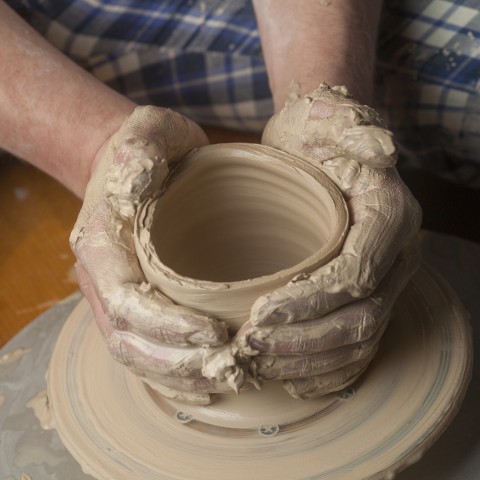
6. Traditional Turkish Holidays
Like in other cultures, holidays are a huge part of the Turkish culture and lifestyle. Turkish people celebrate two types of holidays: national and religious.
A- National Holidays
There are several national holidays in Turkey throughout the year, including:
During the national holidays, all official offices are closed and the cities are decorated with Turkish flags. You can also see flags hanging from the windows and balconies of houses and offices.
B- Religious Holidays
There are two moveable religious holidays every year.
Ramadan
Ramadan is the month when Muslims fast for thirty days, between the sunrise and the sunset of each day. A three-day holiday follows the month of Ramadan. During this holiday, people visit other family members, friends, etc. Younger ones kiss older ones’ right hand and then put it on their own foreheads; this is a symbol of respect. Candy, chocolate, and Turkish coffee are offered to visitors, and children are given money as allowance.
The Feast of Sacrifice
This holiday is four days long. Most households, if they can afford it financially, sacrifice an animal (usually a sheep) in a special ritual. The meat is shared with relatives and neighbors, with one third of the meat usually given to those who are in need. In addition to these special traditions, the same features of the Ramadan holiday apply to this one.
7. Other Cultural Highlights
To conclude, let’s go over a few more Turkish culture characteristics you should be familiar with before visiting the country!
A- Food and Beverages
Turkey’s food culture is a major component of both daily life and special occasions. I’m sure you’re already well aware of the grand reputation Turkish cuisine has made for itself, so I’ll only list some of the most outstanding food and drink items here. But if you would like to know more about Turkish food, you can visit our lesson “How is the Turkish Food?“
As for beverages, rakı is an alcoholic beverage which is consumed quite a bit in Turkey. It is similar to ouzo.
Another thing I should mention is that Turkish tea culture is alive and well! Turkish people drink tea many times a day, and anytime of day!
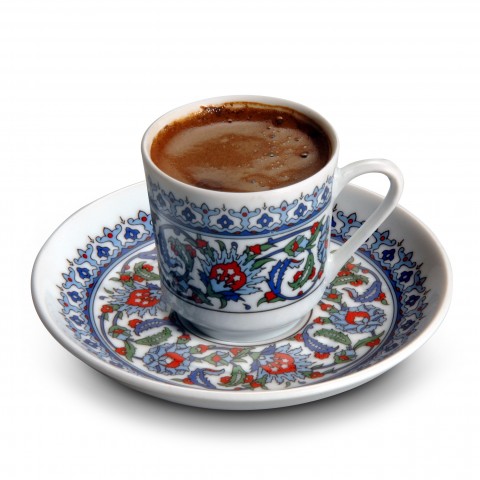
Turkish coffee is another big part of the culture. It’s usually preferred after meals. While talking about Turkish coffee, I must also mention coffee cup reading: usually, when women get together and drink coffee, they ask each other to do the cup reading. It’s a lot of fun to make sense of the shapes formed from the coffee grout.
B- Gestures
Turkish people use quite a number of gestures. Let me just give you a few examples:
1. If a person puts his/her fingers together with the thumb and moves the hand back and forth, it means “good” or “delicious.”
2. Raising the chin up, sometimes with the eyebrows up, means “no.”
3. If a person holds his/her hand next to his/her head and moves the hand like they’re unscrewing a light bulb, then he/she is calling someone “crazy.”
C- Superstitions
Here are just a few Turkish superstitions:
1. Turkish people are usually concerned about being coveted. However, people believe that a blue bead called nazar boncuğu protects them from ‘evil eyes.’ These beads are used in homes, offices, and cars, and are also used as a decorative object. Furthermore, they are used on earrings, necklaces, bracelets, and other forms of jewelry.
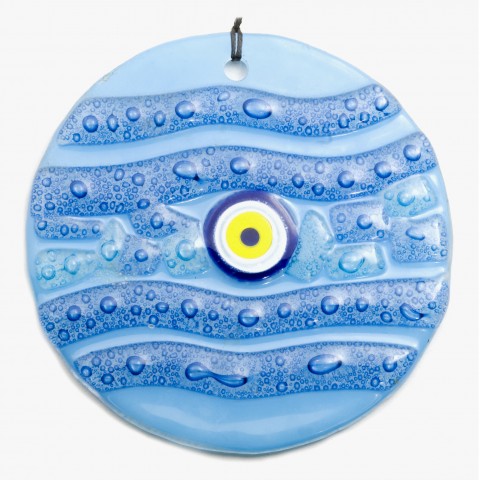
2. Some people believe seeing a black cat brings bad luck.
3. Some think a broken mirror brings seven years of bad luck.
8. Final Thoughts
In this lesson, you learned a variety of useful Turkish culture facts. But there’s a lot more to know!
To get a better grasp of the Turkish language and culture, visit TurkishClass101.com. We provide numerous audio recordings, tons of vocabulary lists, and other free resources including a Turkish-English dictionary for easy reference.
By signing up for a Premium PLUS account, you can also take advantage of our MyTeacher service. You’ll be able to study and practice with your own private tutor, who will give you assignments, answer questions, and help you improve your pronunciation.
Download the app for free and use it wherever you are.
Before you go, let us know in the comments how Turkish culture compares to that in your country. We look forward to hearing from you!










